Annual Report
For the year ended 31st August 2024
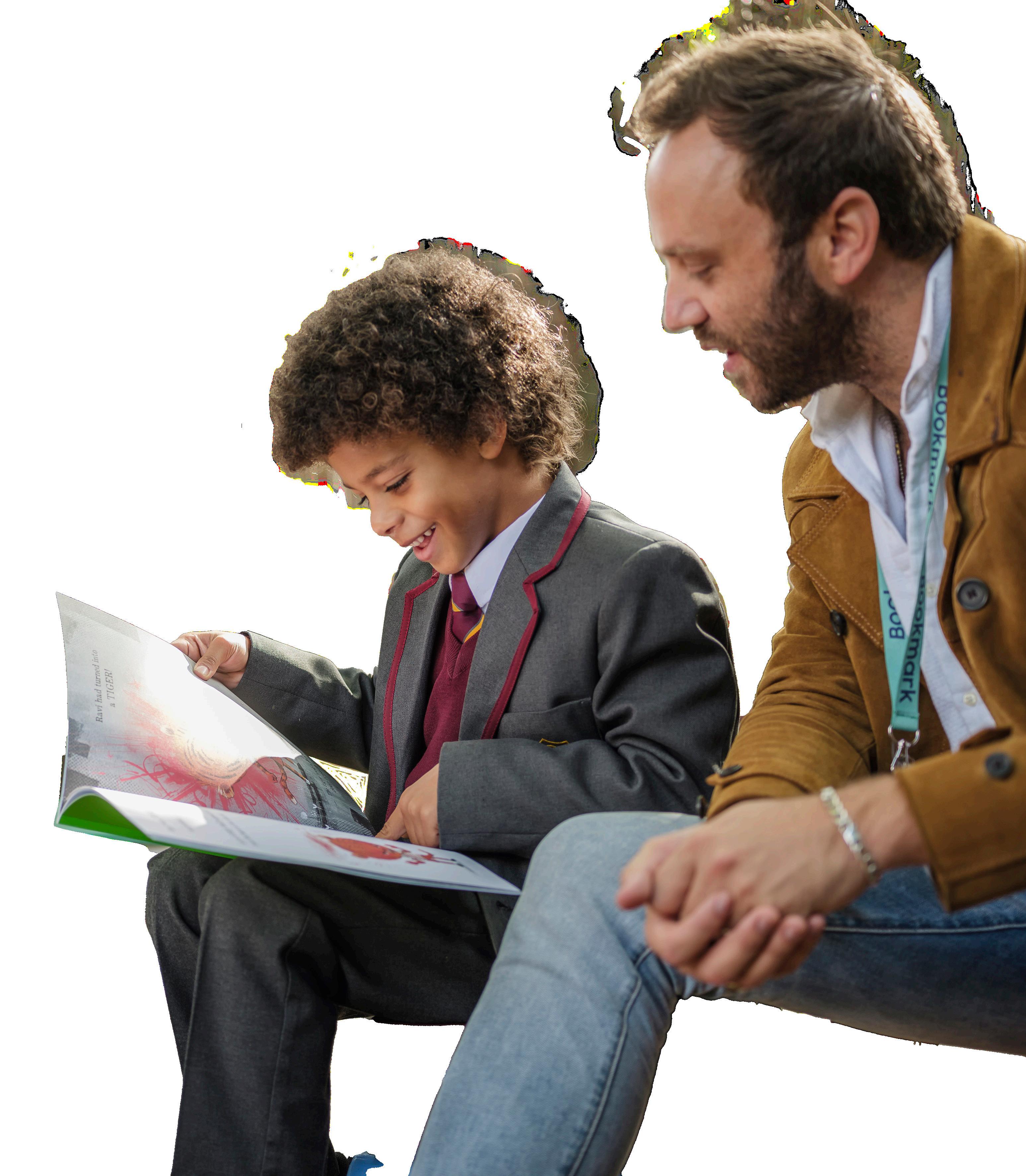
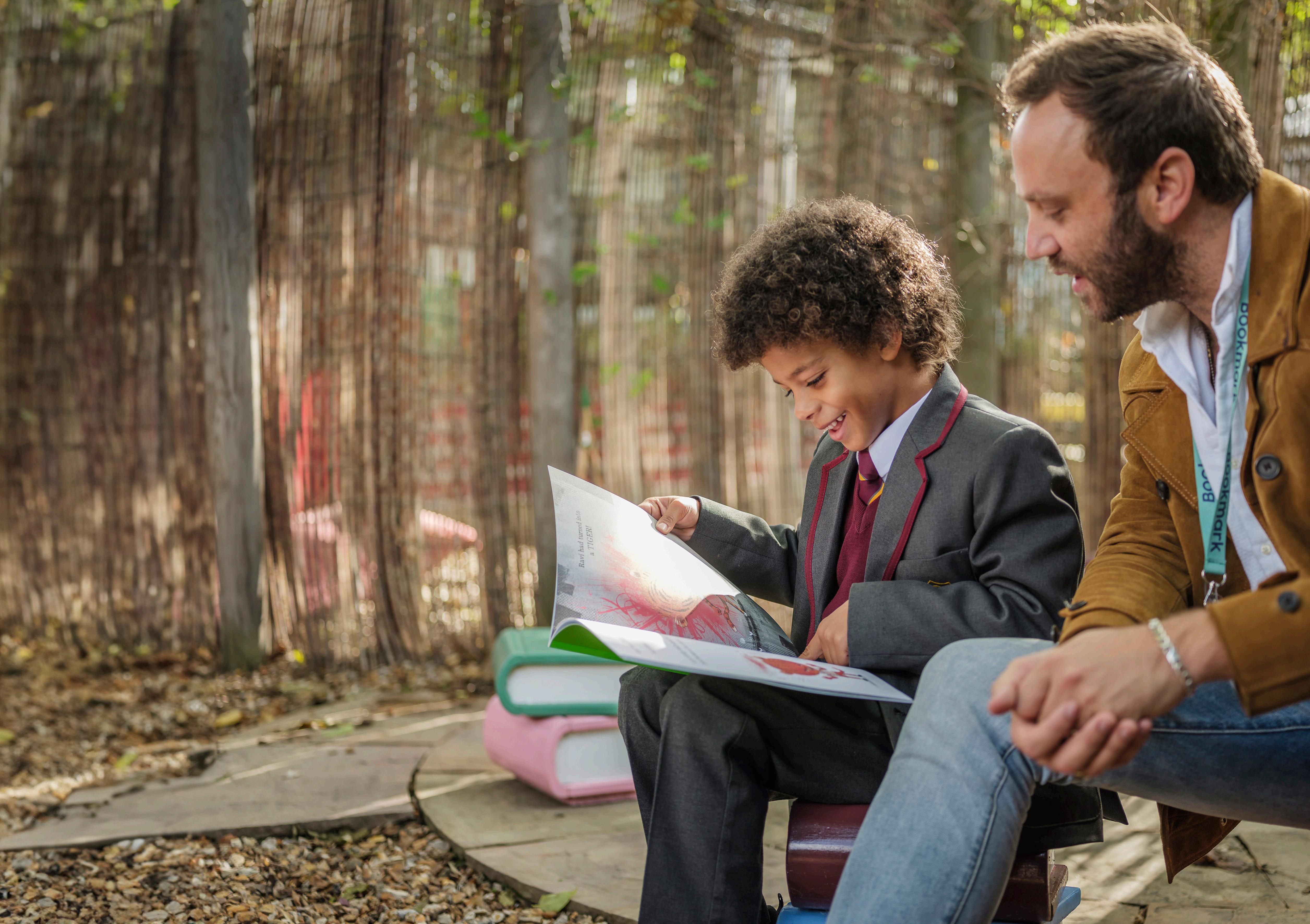
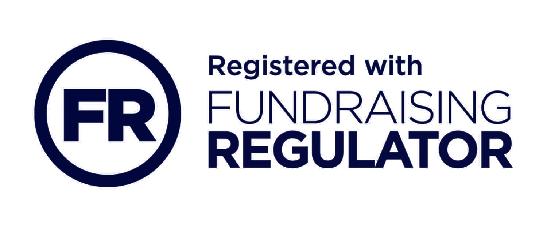

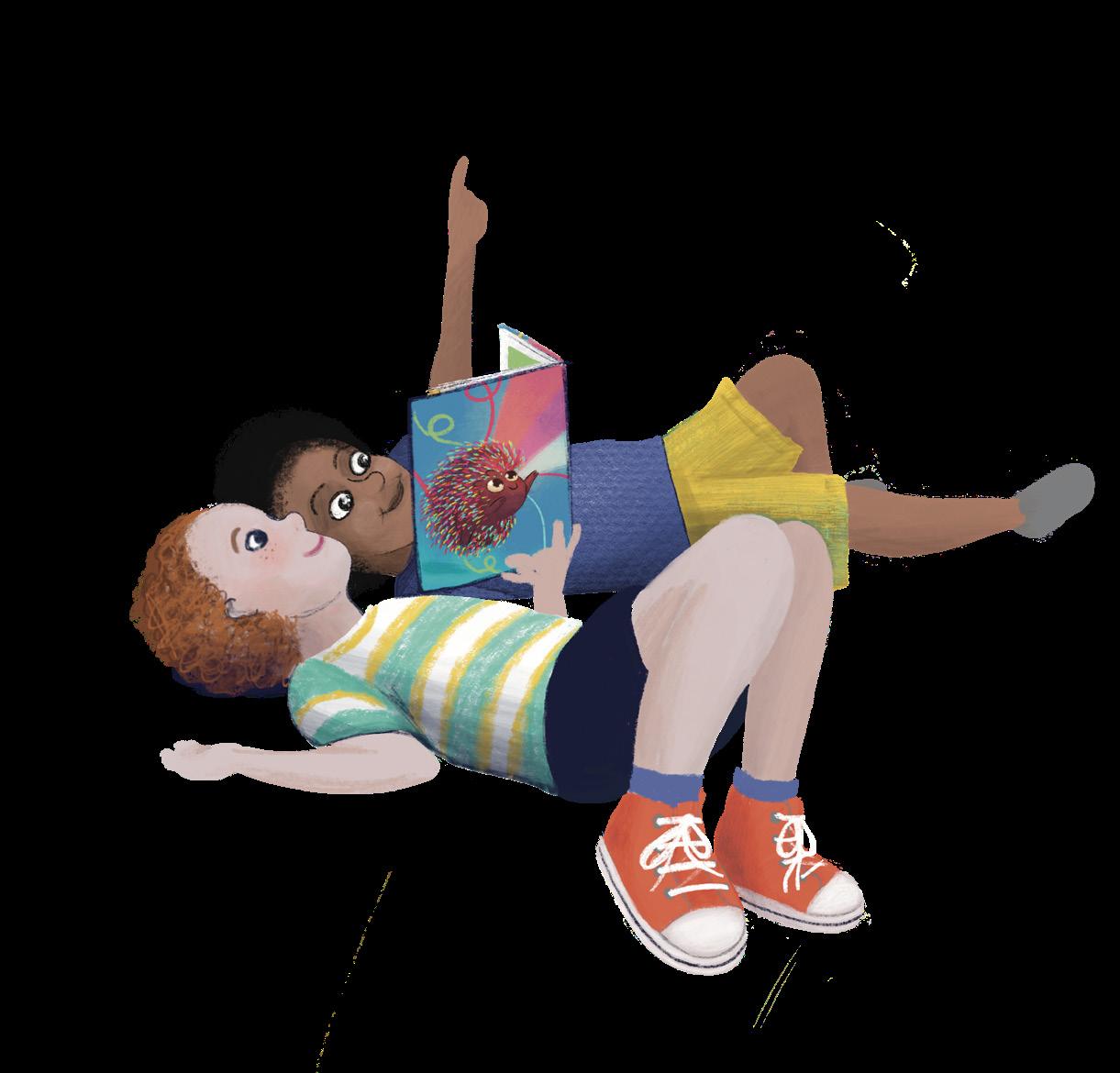

For the year ended 31st August 2024





Reference and Administrative Information
Principal Office and Registered Office:
Third Floor
Charles House
5-11 Regent Street
St James’s
London
SW1Y 4LR
Charity Number: 1177681
Company Number: 11104438
Trustees (who are also the Directors of the Charitable Company)
Paul Fletcher
Philip Neal
Sharon Pindar
Chloe Wright
Helen Jones (appointed 1 April 2024)
Mark Byrne (appointed 1 September 2024)
Charles Walker (resigned 31 March 2024)
Nicole Yost (resigned 16 November 2023)
Key Management Personnel
Current:
Emily Jack
Francis Smith
Dionne Campbell
Daniel Oliver
Chief Executive Officer
Chief Finance and Operations Officer
Head of Technology
Head of Marketing and Communications (joined 12 February 2024)
Laura Burke Head of Fundraising (promoted 22 February 2024)
Anna Croghan
Lauren Landi
Post holders during the period:
Emily Gibbons
Alex Hay
Head of Volunteering (joined 26 February 2024)
Head of Schools (joined 6 November 2024)
Head of Fundraising (returned from maternity leave 27 October 2023 and resigned 18 July 2024)
Interim Head of Fundraising (contract ended 30 November 2023)
Natalie Higgins-Galsworthy Head of Communications and Ambassador Relations (resigned 15th January 2024)
Beatrix Stafford-Smith
Head of Schools (promoted 1 September 2023 and resigned 8 May 2024)
Independent Auditors: Hazlewoods LLP, Staverton Court, Staverton, Cheltenham GL51 0UX
Solicitors: Addleshaw Goddard LLP, One St Peter’s Square, Manchester M2 3DE
Bankers: Santander, Bootle, Merseyside L30 4GB
Investment Managers: Killik & Co, 46 Grosvenor Street, London W1K 3HN
As we reflect on the past year, I am immensely proud of what we have achieved at Bookmark Reading Charity. Our vision remains as vital as ever: we want every child to read.
Despite ongoing challenges – social, economic and educational – your support as donors, trustees, supporters and volunteers has been instrumental in helping us to extend our reach and deepen our impact. Your unwavering belief in our mission fuels our ability to offer meaningful support to the children who need it most. Thank you for being part of Bookmark’s journey.
In the last year, we reached 2,045 children through our One-to-one Reading Programme and delivered 43,779 reading sessions – more than double the number of sessions provided just two years ago. We also launched two new programmes: the Story Starter Programme and the Literacy Partner Programme. These programmes have been designed to support early readers and foster whole school reading cultures.
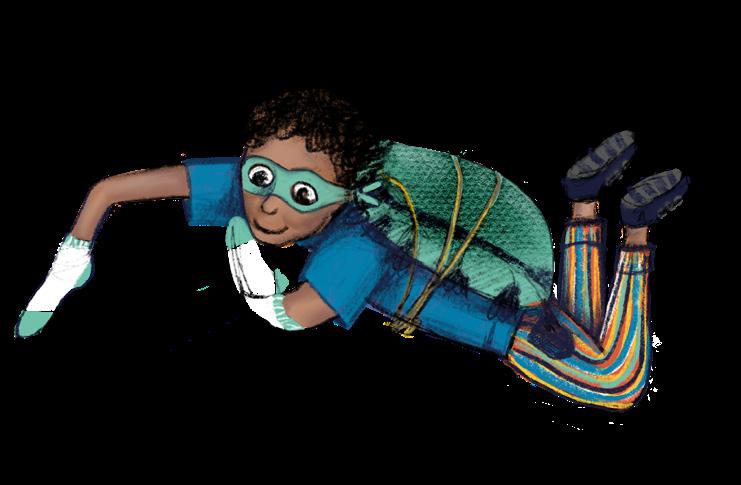
We know that access to reading materials is critical in fostering a love for reading. This year, we provided over 58,000 children with brand new books to ensure that children from disadvantaged backgrounds have the resources they need to explore, learn and grow. Furthermore, we distributed 447,600 copies of The Story Corner magazine – a resource aimed at supporting children with few to no books at home to maintain reading engagement over the school holidays. Our magazine reaches communities most in need and it is distributed through foodbanks, children’s hospitals, prisons, community centres and family support agencies as well as schools.

This year, we provided over 58,000 children with brand new books
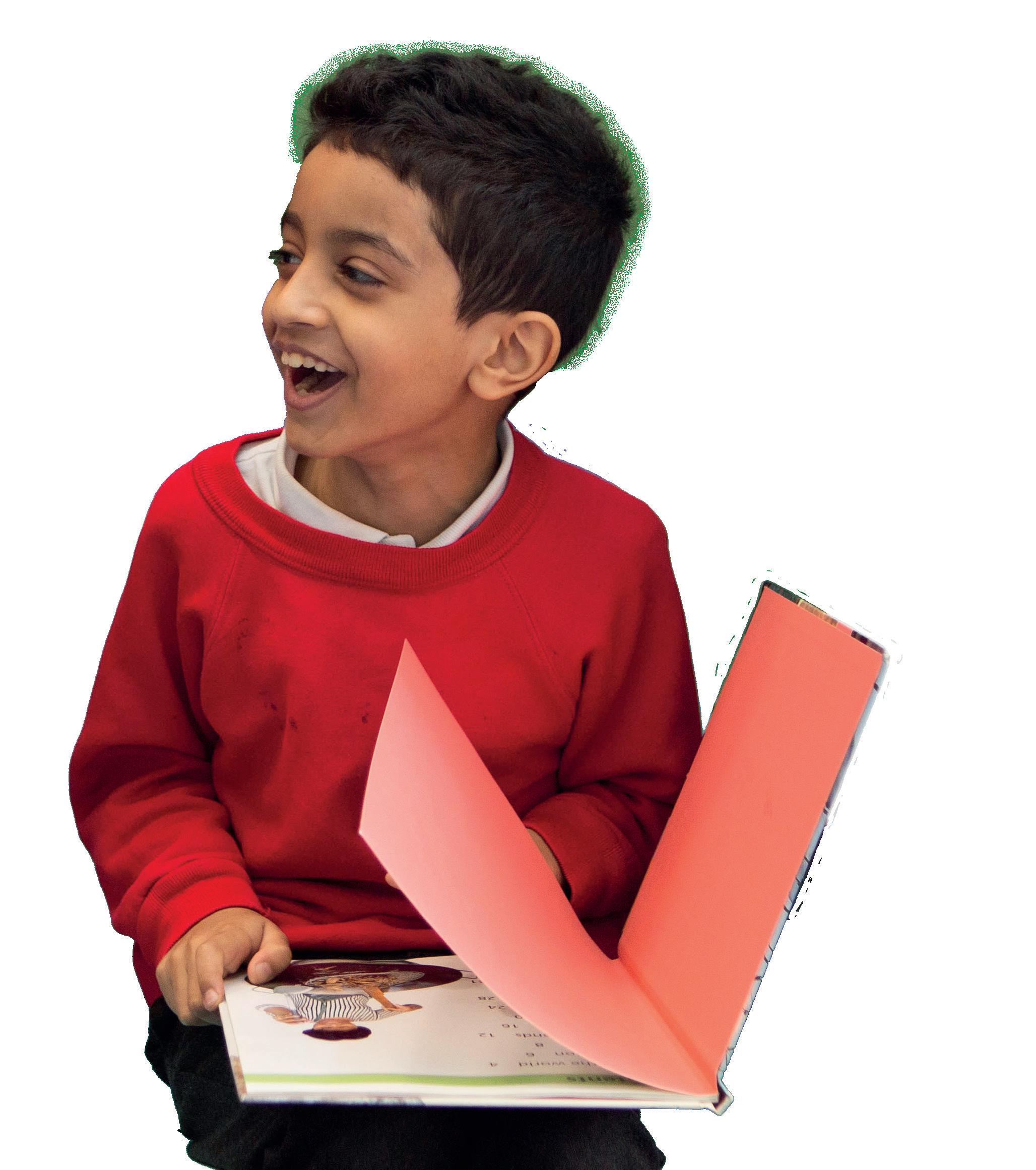
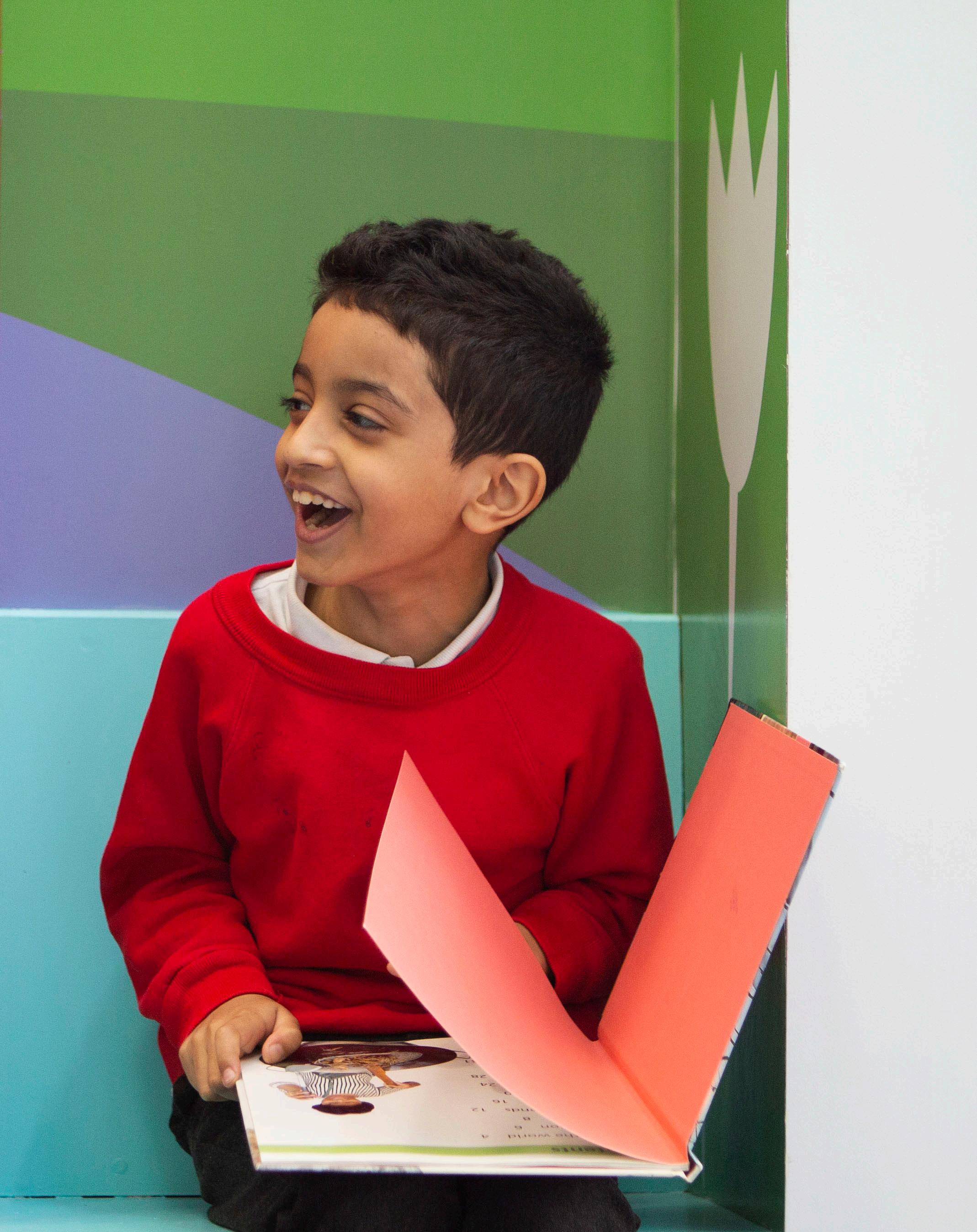
Our efforts have been widely recognised too with a record-high Net Promoter Score of 72 from schools. A clear signal that schools see Bookmark as a highly impactful and valued partner in improving literacy. Importantly, 94% of teachers noticed increased confidence in their pupils’ reading abilities and 99% of teachers confirmed that Bookmark had a positive impact on their students.
Beyond numbers, these achievements reflect the heart of our work: helping children from disadvantaged communities overcome the barriers to literacy. The Fair Education Alliance recently reported that children from disadvantaged backgrounds are leaving primary school 10 months behind their peers; this is the widest gap since 2014. Both the pandemic and cost of living crisis has played a part in this, however, the need to read well is crucial to children’s futures. With your help, we are working to close this gap and change the trajectory of these children’s lives.
Being able to read not only opens doors to educational success but also fosters emotional wellbeing, creativity and self-confidence.
Children need our help more than ever. Our work continues and, looking ahead, our goals are ambitious. Over the next three years, 500,000 children will benefit from one of our reading programmes, across 1,000 schools. Our new strategy, rooted in data and learning, ensures we focus on schools with the greatest need. We will be helping those with higherthan-average levels of deprivation and lower reading scores. We will continue to measure our impact closely; this will be at both individual and school-wide levels.
Together, we can tackle the UK’s literacy crisis. Children must leave primary school with the reading skills they need to succeed.

Emily Jack Bookmark Chief Executive Officer
We want every child to read.
We improve children’s literacy by promoting a reading for pleasure culture in primary schools, with a focus on supporting children in the most disadvantaged communities.

▶ We care deeply about what we do; it is our driving force
▶ We believe in the potential of all children and the power of communities to support them
▶ We fuel our work with optimism and a positive energy, supporting each other through challenges and celebrating our achievements

▶ We are trusted to always keep safeguarding at the heart of what we do
▶ We are honest and open within our teams and across our communities
▶ We are professional and hold the highest expectations of ourselves and one another

are curious
▶ We are interested and constantly learning so that we can adapt to improve the support we provide
▶ We ask questions and contribute outside of our specialties to develop great ideas
▶ We have the courage to challenge the norm in search of a better alternative

▶ We work hard – and smart – to fulfil our promises and make an impact
▶ We are proud of what we have achieved and we know there is always more to do
▶ We each play an important role in Bookmark’s story and consider how our actions impact the charity’s vision

We are a team
▶ We work together with our volunteers, schools, partners and supporters
▶ We embrace diversity and celebrate differing perspectives and backgrounds
▶ We listen well and communicate clearly to seek understanding and achieve better outcomes
The Trustees of Bookmark Reading Charity are delighted to present their report and financial statements for the year ended 31 August 2024.

The financial statements comply with the Charities Act 2011, the Companies Act 2006, the Memorandum and Articles of Association, and Accounting and Reporting by Charities: Statement of Recommended Practice applicable to charities preparing their financial statements in accordance with the Financial Reporting Standard applicable in the UK and Republic of Ireland (Charities SORP (FRS 102)).
At the heart of our mission is a simple yet powerful vision: we want every child to read and since our beginning in 2018, Bookmark have been dedicated to addressing the literacy gap that leaves more than 1 in 4 children leaving primary school without adequate reading skills.
Building on our success over six years, we’re now deepening our impact by fostering a love of reading among more children. Over the next three years, we are aiming to reach 1,000 schools and benefit 500,000 children, ensuring they have the opportunity to experience the transformative power of literacy. Our strategy explains how we will improve children’s literacy by building a whole school reading culture around reading for pleasure. This strategy embodies our commitment to prioritising children in disadvantaged communities, where the barriers to reading are greatest.
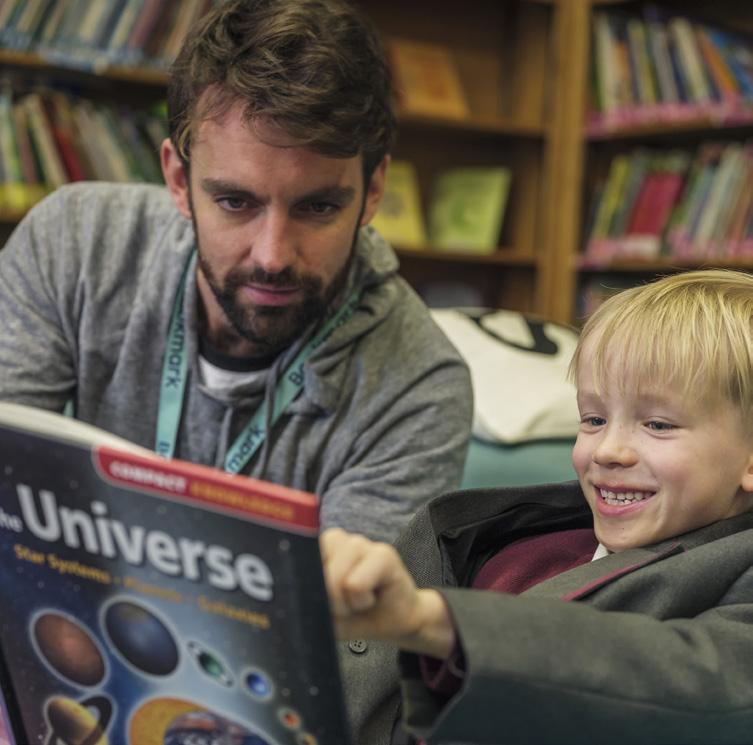

We will achieve our mission by implementing the following five pathways to reading:
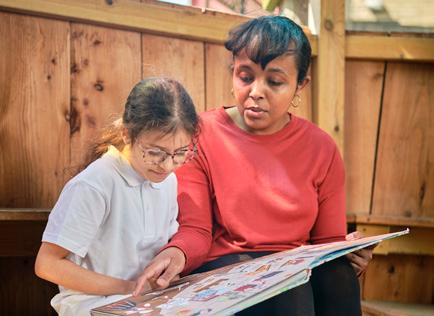
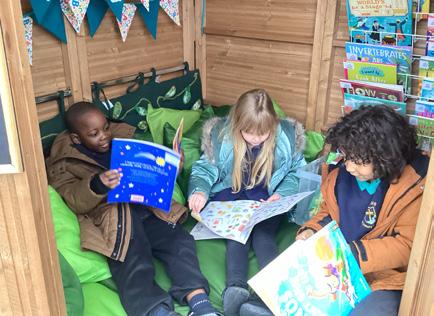
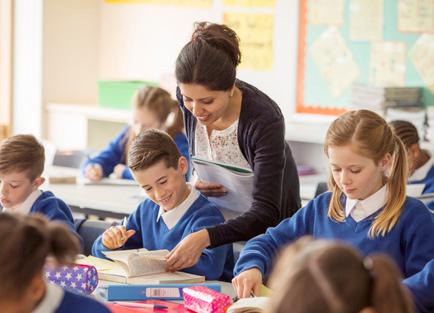

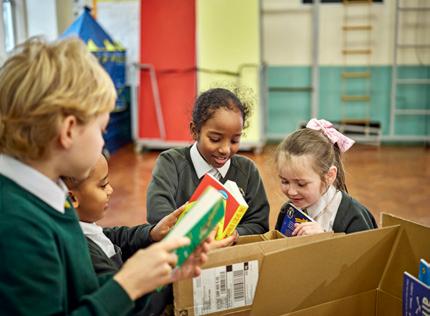


This work will be underpinned by our 10 literacy programmes:
Children need us now more than ever
We have big ambitions to expand our reach and increase our depth of support for children in the most disadvantaged communities. Over the course of the next three years, we aim to have benefited 500,000 children across 1,000 schools by improving reading levels and engagement on both a one-toone and whole school level.
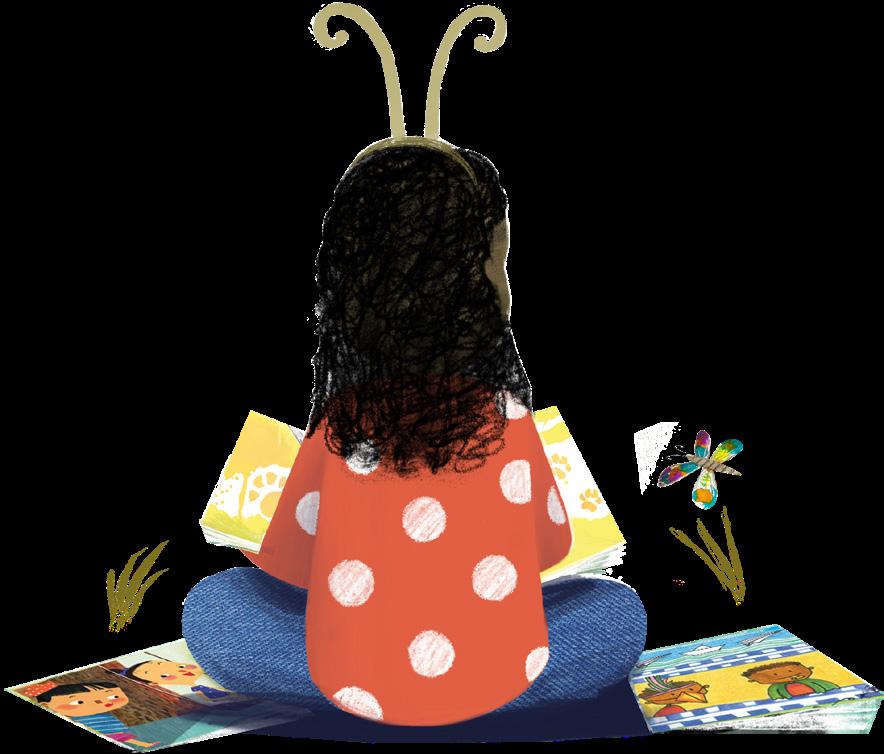
During the academic year 2023/24, we have been developing and enhancing our programmes in anticipation of our new three-year strategy. We have piloted and implemented new programmes which we plan to expand over the next three years.
We work with schools to develop whole school reading cultures. Schools participating in our One-to-one Reading Programme do so on a package basis which links the number of programmes they run to a range of benefits. Over the course of the year, we have reviewed the schools who receive our One-to-one Reading Programme to ensure they align with our eligibility criteria. During the year we have reduced the number of partner schools receiving our One-to-one Reading Programme to provide a deeper level of support for the children who need this support the most.
Number of schools receiving our One-to-one Reading Programme
2020/21 2021/22
90 (56% in London)
171 (56% in London)
2022/23 2023/24
157 (42% in London)
146 (40% in London)
At Athelstan Primary School, based in Sheffield, almost a third of children at the school receive pupil premium funding (31%) and many speak English as an additional language. Athelstan received Bookmark’s Your Story Corner pack this year with 200 brand-new, high-quality books and reading resources for children aged 4 to 9 to revitalize their reading spaces and encourage reading for pleasure.
We spoke to the English lead at Athelstan Primary School who said the Your Story Corner resources came at a ‘perfect time’ as the school began to envision their whole school reading culture for the first time. They have already noticed some ‘really positive engagement’ with the new books. We were told that children who were previously not reading ‘are now genuinely enjoying what they read’ and that ‘ it’s pleasurable to them instead of a task to be ticked off the list.’
Your Story Corner packs are carefully curated to include a variety of diverse and inclusive books. With the school based in a diverse area ‘having an injection of a new kind of very wellchosen stock that reflects current
priorities around representation both in terms of characters and authors is really good’. The children at Athelstan have reading time before school every day and there has been a noticeable change in excitement around the books that has ‘made children reflect more on what they’re going to enjoy’. For example, ‘some children have really diversified what they’re choosing [to read]. I’m not getting children exclusively going to get another Roald Dahl book because that’s the only author they’ve ever heard of. There’s definitely a wider range of books that [the children] are interested in’.
It’s not just the children who have a more positive engagement with reading and the reading spaces of the school, but the staff too, who have been ‘redirected to the importance of what their reading area looks like. We’ve gone from some quite tatty piles of stock to staff involving children in organising the books and [thinking] how you market them in a way that makes them looks like you want to read them.’
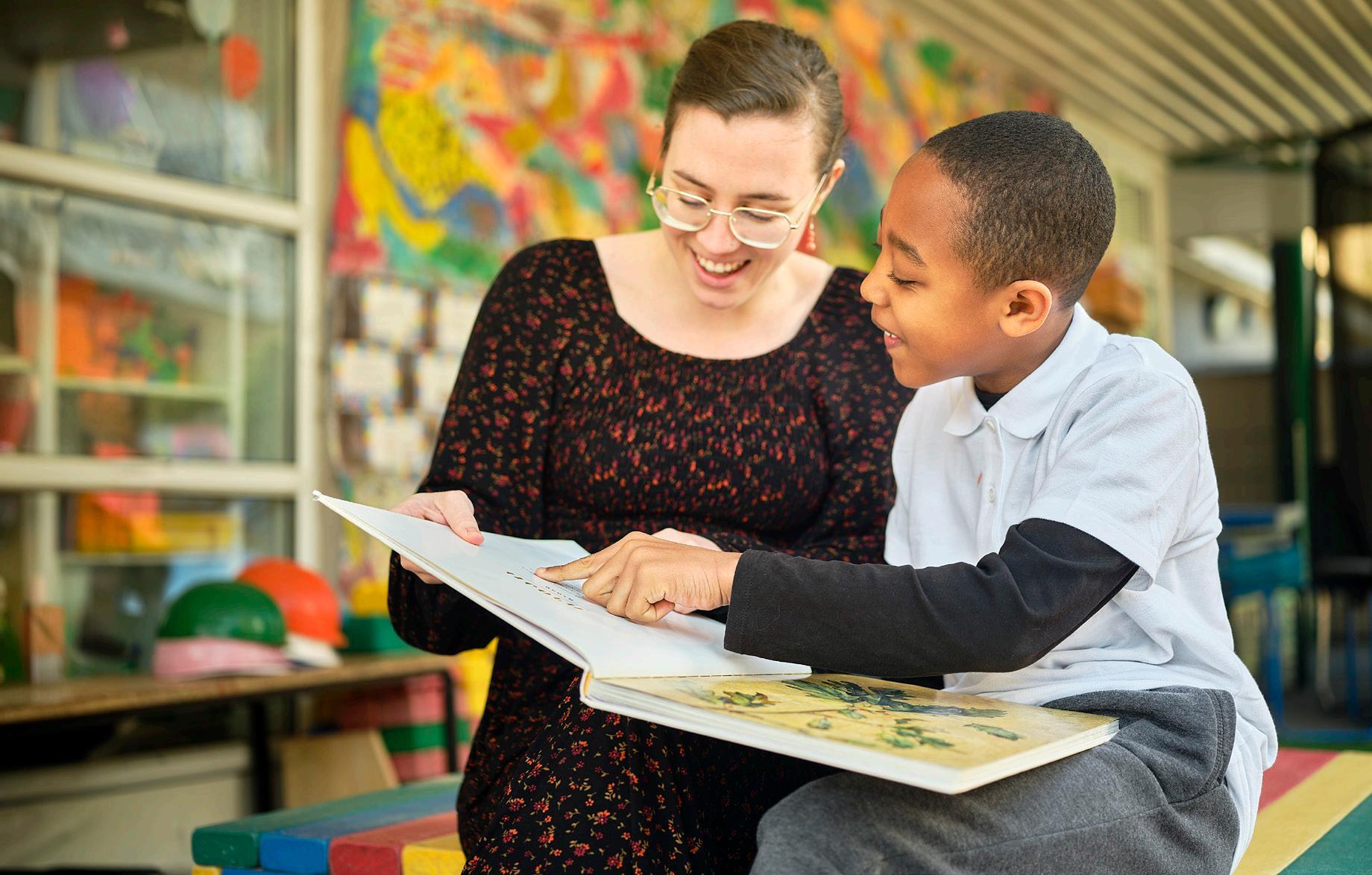
I’ve been volunteering with Bookmark for a few years and find them an excellent organisation. The resources are great, and the arrangements are clear. That means all volunteering time is spent directly supporting the reader. This is very unusual in volunteering, and is a very fulfilling experience for the volunteer, and I think for the reader too. Congratulations to the whole team.”
*Provided by a volunteer through the End of Programme survey in Summer 2023/24.
Volunteers are at the heart of what we do at Bookmark. Our volunteers come from a wide range of backgrounds, and our growth in volunteer numbers is largely linked to our always-on marketing activity or through our corporate partners, where employees donate their time as volunteers. We have expanded our volunteering opportunities to new cohorts. This includes our new corporate volunteering offer and Reading Mentor programme for 16-17 year olds.
We want to celebrate our volunteers and the time they give to read with children on Bookmark programmes. We are grateful for all the time and support our volunteers give to the children on our programmes.
Number of Volunteers
2020/21
1,167 2021/22
2,186
2,937
This year, we have been able to support 1,842 children with at least one full One-to-one Reading Programme and 2,056 pupils received at least one reading session this year. We have been able to deliver this support through 43,779 reading sessions which is close to 22,000 hours of one-to-one reading support, equivalent to 2.28 years of continuous reading.
On average, children have received over 21 one-to-one reading sessions throughout the year, this is up from 17 in the prior year. This increased number of sessions per child has led to a decrease in the number of pupils supported. However, those pupils are receiving a greater level of individual support.
A London-based primary school partnered with Bookmark to provide one-to-one reading support to children at their school who must overcome additional barriers as they learn to read.
Number of children supported
2020/21
871 2022/23
1,856 2021/22
1,384 2023/24

1,645
Two children, Amy* and Eden*, started Year 2 reading at an early Year 1 level. They were extremely far behind, and were facing the SATs, national curriculum assessments which they would need to complete at the end of the year. They were assigned to Bookmark’s reading programme, because even though they were making progress at school, they didn’t have anyone reading with them at home.
With Bookmark’s support both children made rapid progress.
‘They’re now in Year 3 and reading at the expected level. Even though they were 6 to 8 months behind, they’ve now caught up to where they should be. As their teachers it was amazing to see them go into Key Stage 2 and be ready for it.’
Their teacher explained that ‘on the Bookmark programme their confidence skyrocketed.’ In just having half an hour every week or more, they were able to grow to identify themselves as readers. The programme was seen as ‘special time to read’ and meant the children didn’t realise it was a reading intervention.
*Children’s names have been changed for anonymity.
2020/21
13,993 reading sessions 2021/22
23,870 reading sessions
2022/23 2023/24
40,100 reading sessions
43,779 reading sessions
Our new three-year strategy is focused on five pathways to reading:
• One-to-one reading support and positive role models
• Engaging reading spaces and high-quality, diverse reading resources
• Teacher training and resources
• Creating a reading buzz across the school
• Family and parental engagement
These pathways are underpinned by 10 literacy programmes, nine in addition to our One-to-one Reading Programme.
We create engaging reading spaces with high-quality reading resources. This includes 200 new books, teacher CPD resources and engaging materials. These spaces foster an environment for children to become confident young readers and inspire a lifelong love of reading.
This year, we launched our Your Story Corner Programme into three new areas:
Wolverhampton
62 schools / 12,400 books Sheffield 116 schools / 23,200 books
Barking & Dagenham
50 schools / 10,000 books
Next year, we will continue to expand into new areas, with a focus on Derbyshire in Autumn 2024.
Following an in-depth literacy consultation, we provide a detailed and tailored action plan to each school to help them deliver improvements in whole school reading cultures. This action plan is accompanied by targeted funding of up to £10,000 per school. Our Literacy Partner Programme is also an incubator for developing and evaluating new service lines. This gives us the opportunity to test different ways of embedding a whole school reading culture in a school. Once new service lines have been tested on a small scale, and an effective impact has been seen, these service lines can be offered as part of one or more of our programmes.
We launched our multi-year Literacy Partner Programme grants in the summer term, working with 40 schools to develop two-year action plans to develop a whole school reading culture. The second cohort for this programme will be 50 schools and it will launch in January 2025.

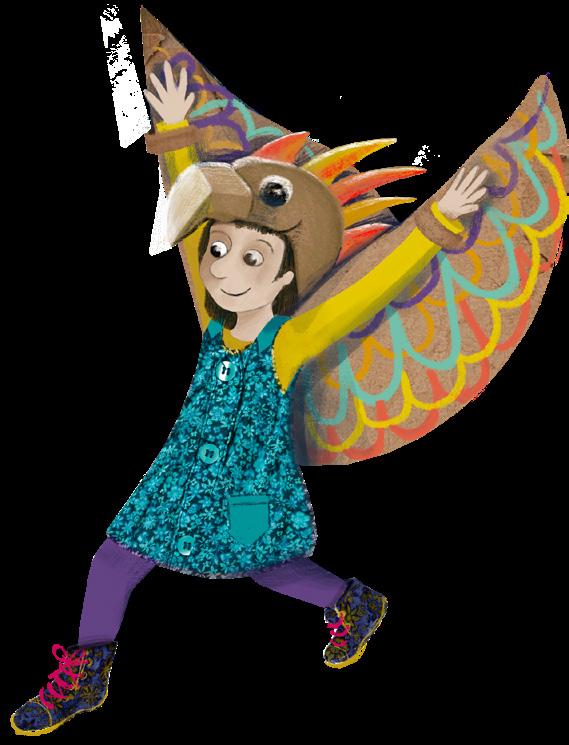
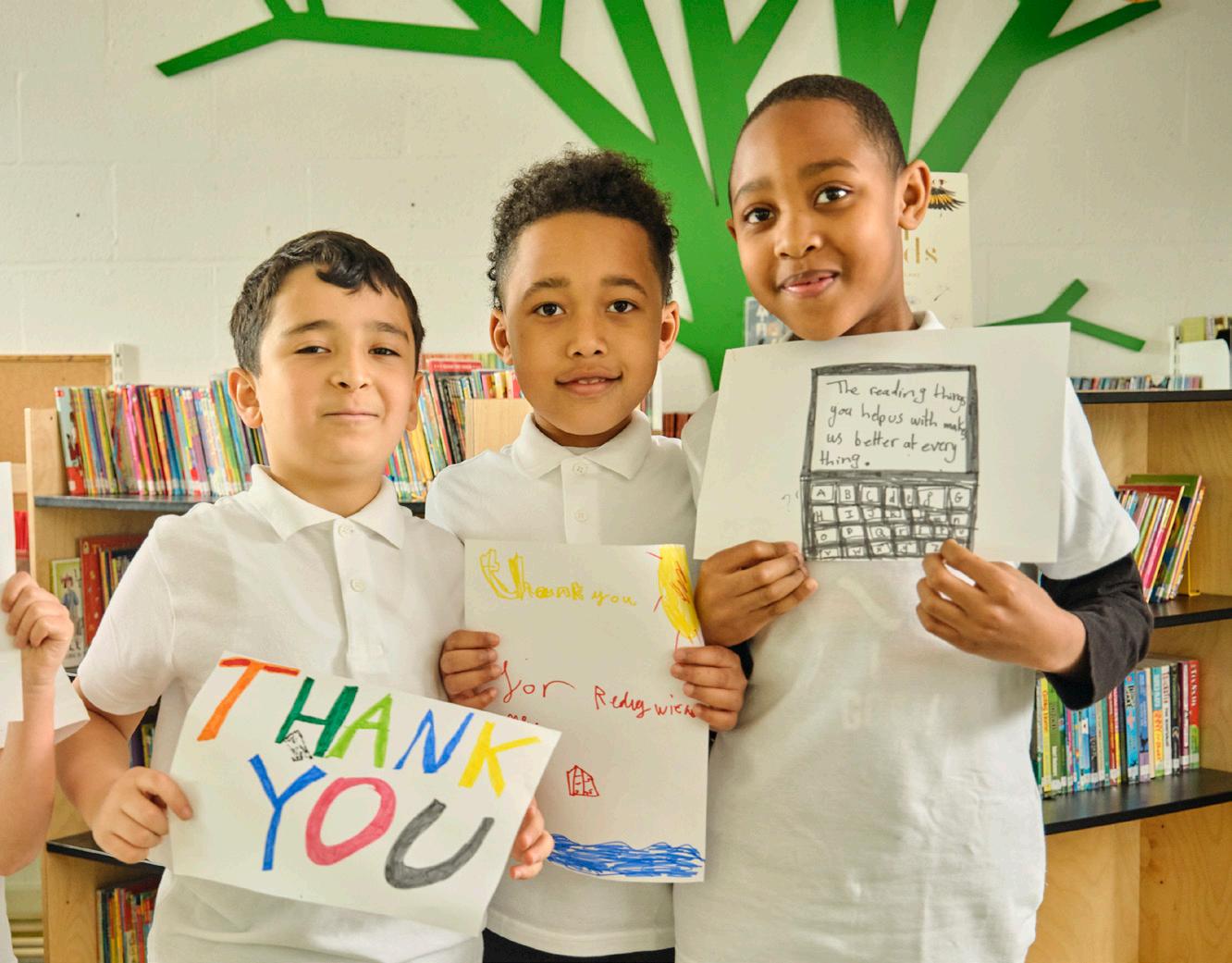
Our early years provision includes packs with resources for children aged 4-5. This is to help ignite the joy of reading from an early age and equip children with resources before starting at one of our partner schools. These packs have been created by following the government’s non-statutory curriculum guidance for the Early Years Foundation Stage. They include a book, an early year’s version of our The Story Corner magazine, stationery, storytelling props and family engagement resources to inspire reading enjoyment at home and in the classroom. We want all children to start school with the resources they need to set them up for success.
We launched our Story Starter Programme to support early years development. Curated with the government’s non-statutory guidance Development Matters in mind, these packs went to 1,445 children before the summer holidays.
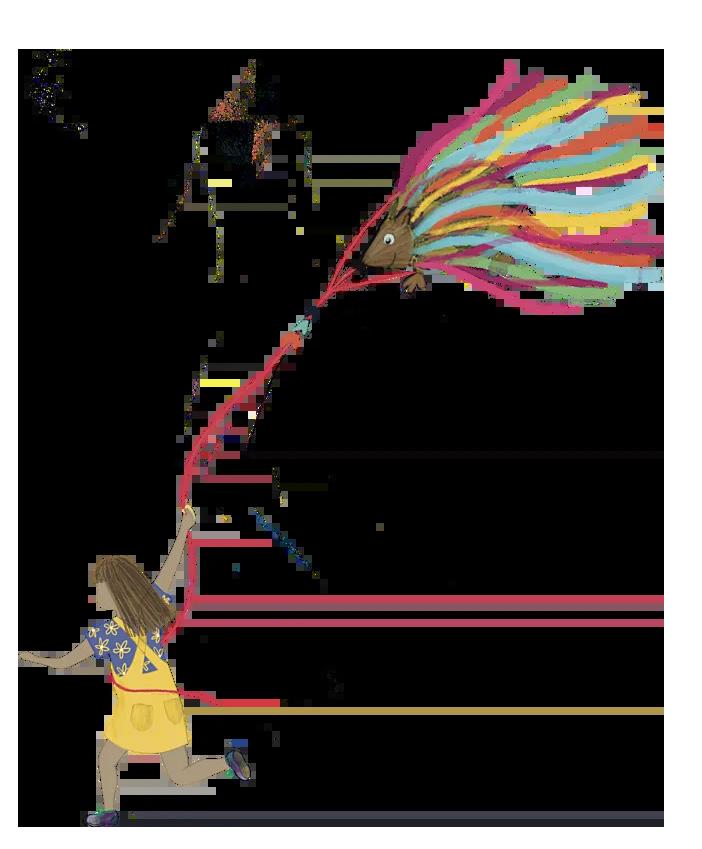
Our termly magazine provides high-quality reading materials for children to take home. The magazine is designed and distributed to children who may not have a book at home to prevent learning loss outside school settings. It is distributed through schools and community settings, including food banks, warm banks, prisons, hospitals and refuges.
We celebrated our 10th issue of the Story Corner Magazine this year. We have sent 447,600 copies this year across school and community-based settings. We launched our early years version of the Story Corner Magazine which was included in our Story Starter Packs and our Graphic Novel copy is going live in Autumn 24/25.
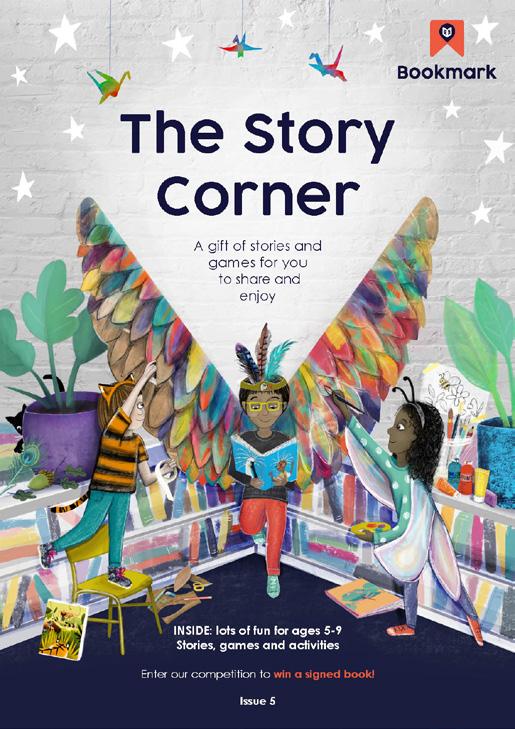
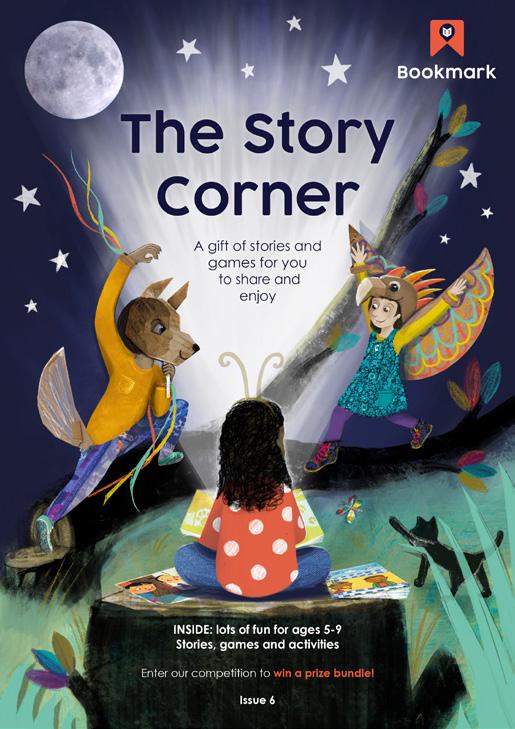
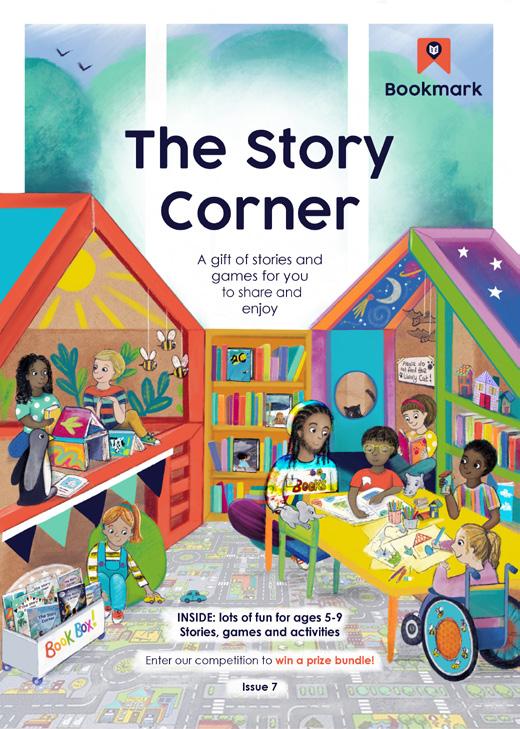
Schools are sent termly packs of new, highquality and diverse books. Each of these packs is centred on a different theme, focusing on the type of books we know are often missing from school libraries (i.e. graphic novels, poetry, nonfiction). We invite a different figure or organisation, well known in the education or literacy space, to curate these book packs. The packs are sent out with our scrapbooks as part of a whole school reading challenge to help embed a rich reading culture.
We sent 80 non-fiction themed rocket packs in the Autumn, followed by 110 ‘picture books for all ages’ themed packs in the Spring. Summer packs landed in September and are ‘Books with a Sprinkle of Magic’ themed.
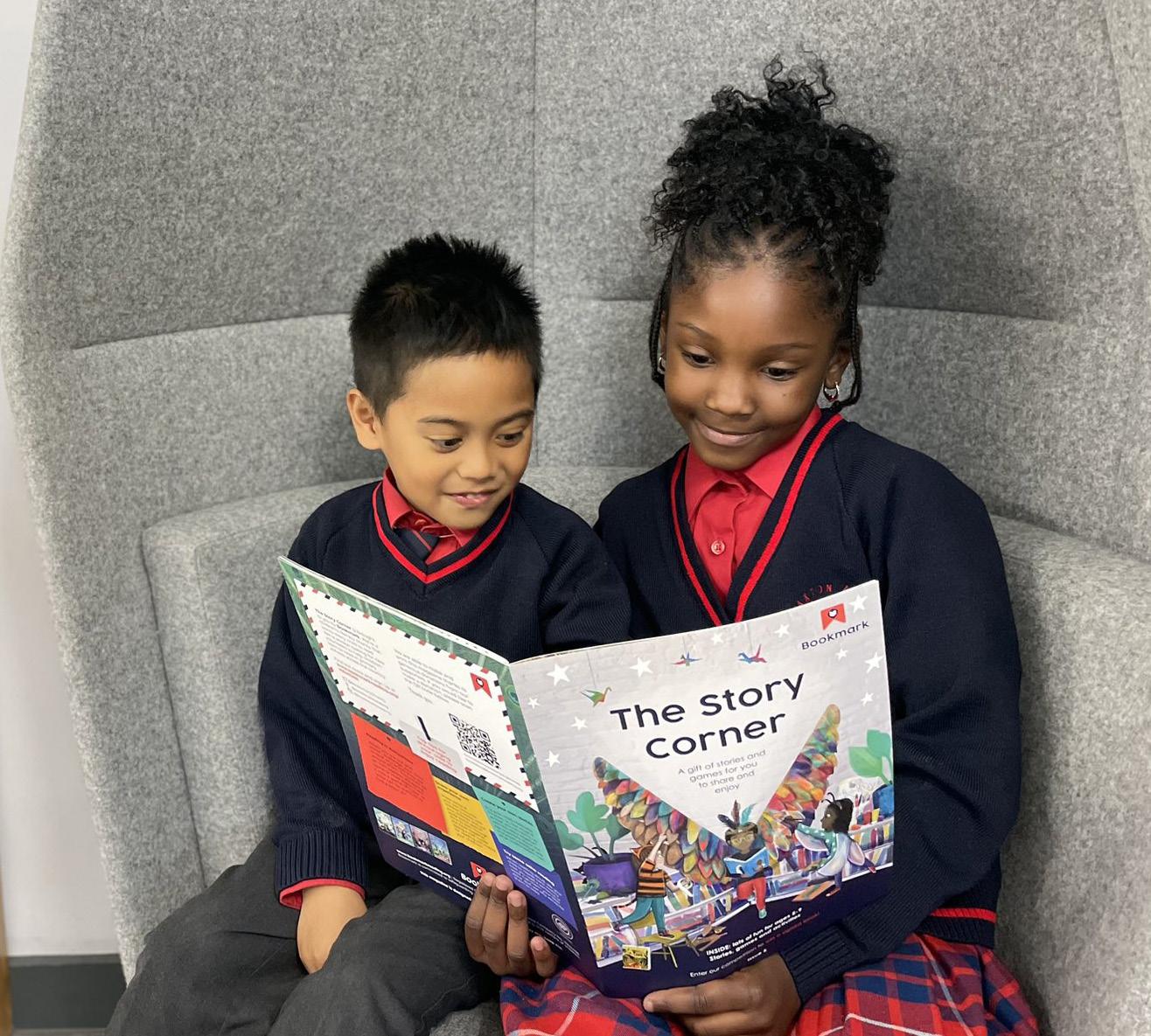
We have sent
447,600 copies of The Story Corner magazine this year to school and community based settings
This programme is designed to build on the foundations of the Your Story Corner Programme by providing sustainable ongoing support to schools. This is to continue the improvement of whole school reading cultures. Each school within the network benefits from up to £1,000 of resources per year, plus access to resources and training developed by us. The programme will provide networking opportunities for teachers and literacy leads to collaborate and share best practice.
To build on the success of our Your Story Corner Programme we launched the School Network Programme with 83 schools across Birmingham, Nottingham, Medway and Lincolnshire.
We provide schools with CPD grants and access to memberships with third-party organisations to assist them with embedding a whole school reading culture in their school. We also run webinars, distribute videos and provide other resources to help with teacher training.
We offered 38 grants across our partner schools this year to support teacher CPD and whole school reading culture initiatives. The grants will support literacy projects at the start of the new academic year.
We are developing a range of book clubs to engage reluctant readers. Schools are provided with mini libraries in each genre, plus additional resources to spark a reading buzz. We provide a plan for 10 book club sessions so that teachers have a clear understanding of the outcome for each session. The book clubs have been designed to run termly.
We delivered 13 comic book clubs this year across our schools. The team are currently developing our next club, nonfiction, which will launch this year. This new pack will provide a reading club for reluctant readers, focused on fact finding!
We understand the challenges that many schools face with family engagement. We will provide support in disadvantaged communities by distributing home resources and video content to empower family members to support their child’s reading for pleasure and become reading champions at home. We will build strategic collaborations to enhance our work and amplify other organisations’ work in this area.
This is a new programme of work, which is being developed as part of our new three-year strategy. As part of our Story Starter Programme, parents were provided with videos guides supporting parents with engaging storytelling, reading wordless stories and how to use the resources provided in the pack.

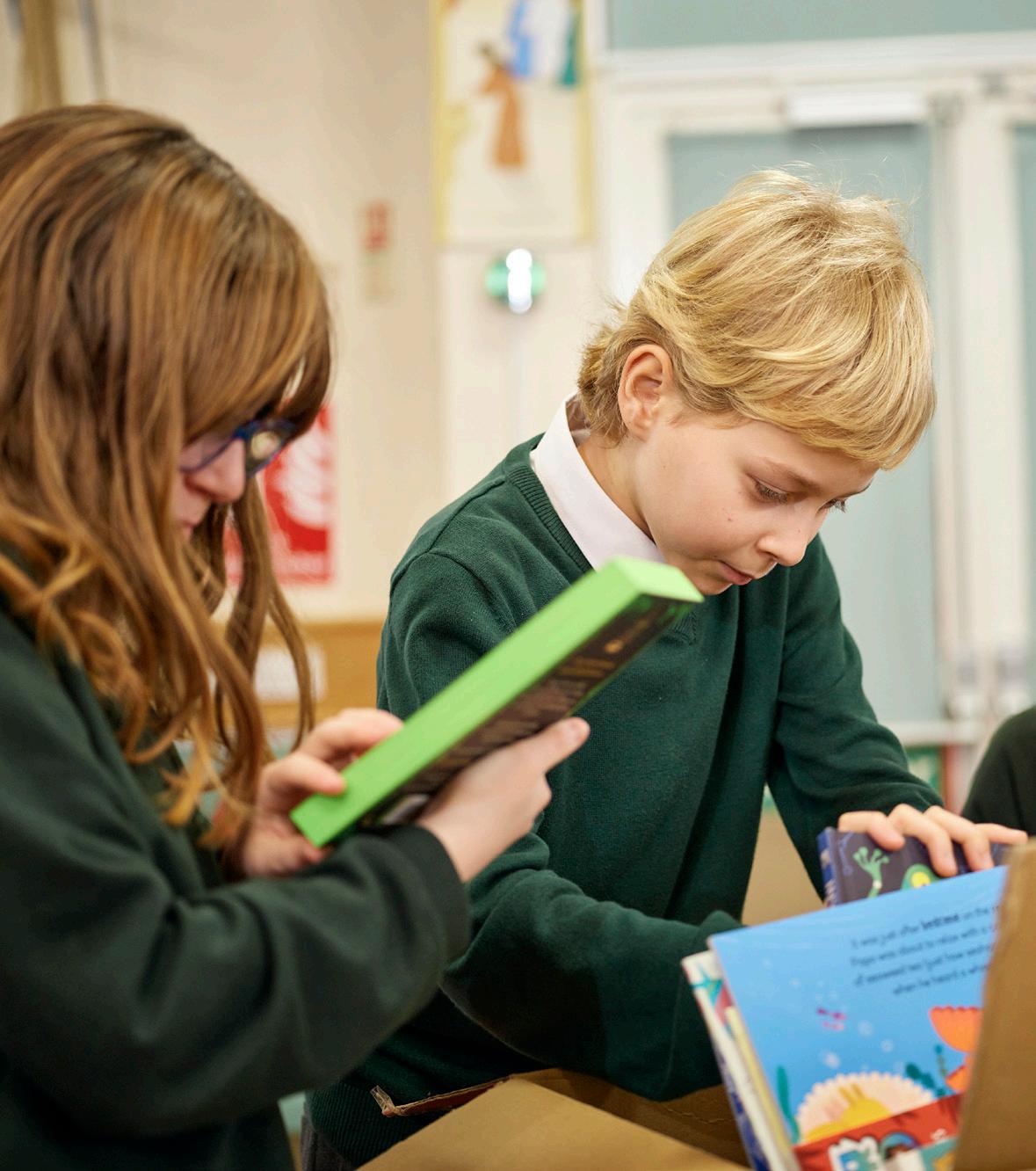
During the year,
505 schools received at least one literacy programme
In 2024/25 , we aim to deliver:
50,000 reading sessions to children, which will represent 14% growth year-on-year
164 Your Story Corner packs across three new regions
500,000
Story Corner magazines across our partner schools and our communities

545 Rocket Packs

62 individual grants across our gold and platinum schools to support CPD and whole school reading culture initiatives


70 Book Clubs
82 Our School Network Programme to 82 schools
18,000 Our Family Engagement Programme to 18,000 families
4,000 Story Starter Packs to children ahead of the summer holidays
50 new Literacy Partner Programme grants will be awarded
We will deliver these targets by embedding our three-year strategy, focusing on our strategic aims to expand our reach and increase our depth. We will leverage the foundations of our strategy to continue to drive performance to enable more children to read.
At Bookmark, our programmes support reading for pleasure in children aged 4 to 10 years old, which has a strongly evidenced link to improvements in children’s reading attitudes, behaviours, skills and reading attainment. We evaluate the changes in children on our programmes to ensure that we can demonstrate these outcomes for participating children. We also evaluate how our programmes support reading for pleasure in schools.
Vital to achieving this is making sure that our programmes are based on data and research, to ensure that we have the maximum impact. Our One-to-one Reading Programme was designed using evidence-based recommendations from The Education Endowment Foundation (EEF) and The Open University (The OU). Every year we share our evaluation findings in our Impact Report. This is available at the start of the calendar year following the end of the most recent academic year . The latest full report is available here.
Many children leave primary school with poor reading skills which directly contributes to poor educational attainment, lower literacy in adulthood and barriers to success in life.
Many children do not have opportunities for one-to-one reading or reading role models. Less able readers have fewer opportunities to improve their reading. Many children do not enjoy reading. Many children do not own their own book or have access to a library. Many children struggle to see themselves in what they read.
Schools have limited resources and support to develop reading for pleasure and wholeschool reading culture.
Our team – with strong expertise and experience of partnering with schools to develop offerings that are informed by data-driven insights, a strong evidence base, ongoing evaluation and impact measurement.
Our volunteers – who are enthusiastic, trained and supported by Bookmark to volunteer online and in-person.
Our technology – which is utilised to support effective and responsive programme booking and delivery, including via an online reading platform.
Our resources – curated, high-quality, and diverse books and reading resources.
Our training – CPD for teachers and support for family engagement.
Our reading programme, in which trained Bookmark volunteers deliver one-to-one reading sessions to children aged 5-10.
Curation and delivery of new, high-quality and diverse books and reading resources, including our own termly The Story Corner magazine, which enhance reading spaces in schools.
Provision of grants, literacy consultancy and training resources, with a focus on facilitating teacher training and access to CPD.
Organisation of events, such as book clubs and author visits, with a focus on schools to generate a buzz around reading.
Collaborating with schools to promote family and parental engagement.
Children attend reading sessions with a volunteer, engaging in one-to-one reading support.
Children and schools have brand new, diverse, high-quality books and reading resources, including The Story Corner magazine.
Schools access grants, literacy consultancy support and training resources to support reading for pleasure and build whole school reading cultures.
Schools improve their one-to-one reading support and children connect with positive role models.
Schools improve their reading resources and reading spaces to encourage children’s reading for pleasure
Schools have access to quality teacher training and resources, which improve their approach to reading for pleasure.
Schools generate a buzz around reading.
Schools improve parental and family engagement with reading.
More children leave primary school having discovered the joy of reading, which better sets them up for success.
This year, Bookmark’s internal evaluation of our core programme continued to collect and analyse:
• The impact of the programme on children’s reading confidence, enjoyment, motivation, fluency, and skills.
• Reading attainment data to assess improvements in reading levels of children who received Bookmark support.
• School and volunteer experience with Bookmark
We have been communicating evaluation findings as concise, termly updates internally at Bookmark. This has ensured continuous improvement actions were identified and acted on as early as possible throughout the year.
In addition to measuring the core One-to-one Reading Programme, the ongoing impact of our Your Story Corner Programme, the Story Corner Magazine and the Rocket Packs have been assessed. These initiatives have continued to produce consistently positive evaluation findings as delivery has extended to new schools and districts. Evaluation data collected through teacher and pupil surveys shows that these initiatives have contributed towards the aims of:
• Supporting schools to develop whole school reading culture through developing reading spaces, providing high-quality reading resources, creating a buzz around reading, and providing teacher CPD.
• Supporting children to develop positive reading attitudes and behaviours.
• Ensuring children have access to good quality reading environments in schools.
• Improving the quality, variety and diversity of resources children have access to in their schools.
We have been working on individual evaluation frameworks for each of programmes, aligned to our new pathways to reading and theory of change.
During the year, we completed a one-year study with ImpactEd on the effectiveness of our One-to-one Reading Programme. The study assessed the attainment progress of pupils who participated in our reading programme throughout the 2023/24 academic year. Data was collected in the form of standardised reading scores from 18 partner schools, including 265 pupils who had been selected for the programme and 648 pupils who had not.
The analysis examined the reading scores of pupils who participated in the programme between the start and end of the academic year and presents their progress. The study further analysed results based on pupil characteristics, providing insights into how the programme



benefits specific groups, particularly those eligible for pupil premium. It compared outcomes between participating pupils and a matched control group of pupils not in our programme using one-to-one propensity score matching to understand how the progress made by pupils on the One-to-one Reading Programme compares with similarly matched pupils not in our programme.
Finally, the study investigated the impact of dosage through the number of sessions per One-to-one Reading Programme and the number of One-to-one Reading Programmes completed by pupils throughout the academic year. Findings were tested for statistical significance and are presented alongside recommendations and supporting evidence for the design of the One-to-one Reading Programme.
Further details and the outcomes of this study can be found here.
In collaboration with ChapterOne, we worked with an external consultant to understand how we can bring children’s voices into our evaluation work. We will be implementing this, in the coming term, to greater understand the impact of Bookmark, through the experience of children on our programmes.
• A positive impact on whole school reading culture by providing a positive impact on our five reading pathways
• A positive impact on pupil’s reading attitudes, behaviours, and skills
• A positive impact on pupil’s reading attainment
• Programme outputs (e.g. the number of pupils supported)
• Changes in whole school reading culture
• Changes in pupils’ reading attitudes, behaviours and skills
• The long-term impact of Bookmark’s support in our partner schools
• School and volunteer experience of Bookmark
• Changes in pupils’ reading attainment pre - and post intervention
• Programme outputs as recorded by internal reporting systems (e.g. Salesforce)
• Improvements in whole school reading culture as reported by teachers and pupils in pre- and post-delivery surveys, interviews and session observations
• Changes in pupils’ reading attitudes, behaviours, and skills as reported by teachers and volunteers in post-delivery surveys, case studies, interviews and focus groups
• Experience of Bookmark as reported by teachers and volunteers in post-delivery surveys
• Reviewing publicly available KS2 reading data for our partner schools
• Pupil reading attainment data pre- and post-intervention
• Measure our impact and define the extent to which our activities meet our programme aims
• Identify actions for continuous improvement which refine our programme delivery and ensures a more positive experience for schools and volunteers
• Assess our progress towards strategic goals and confirm that our internal evidence supports the continued direction of travel
• Understand the scope of our internal evaluation and any limitations to the current evaluation framework that need to be addressed
• Our annual Impact Report which is published each year will evidence our impact, learnings and progress
• We will continue to provide timely internal updates to promote continuous improvement actions and guide strategic decision-making
The Trustees confirm that they have complied with the duty in section 4 of the Charities Act 2011 to have due regard to the Charity Commission’s general guidance on public benefit when reviewing our strategic aims and in planning the activities of the Charity.
The Trustees have satisfied themselves that Bookmark meets the public benefits requirements, in particular:
1. The objectives of the Charity are clear –Bookmark was set up to advance the education of children in the United Kingdom, in particular by promoting and supporting the development of literacy;
2. The aims and activities of the Charity are directly related to its objective, as set out in this report;
3. The people who receive support are entitled to do so according to the criteria set out in the Charity’s objectives – all of Bookmark’s work is focused on children in the UK who require additional reading support.
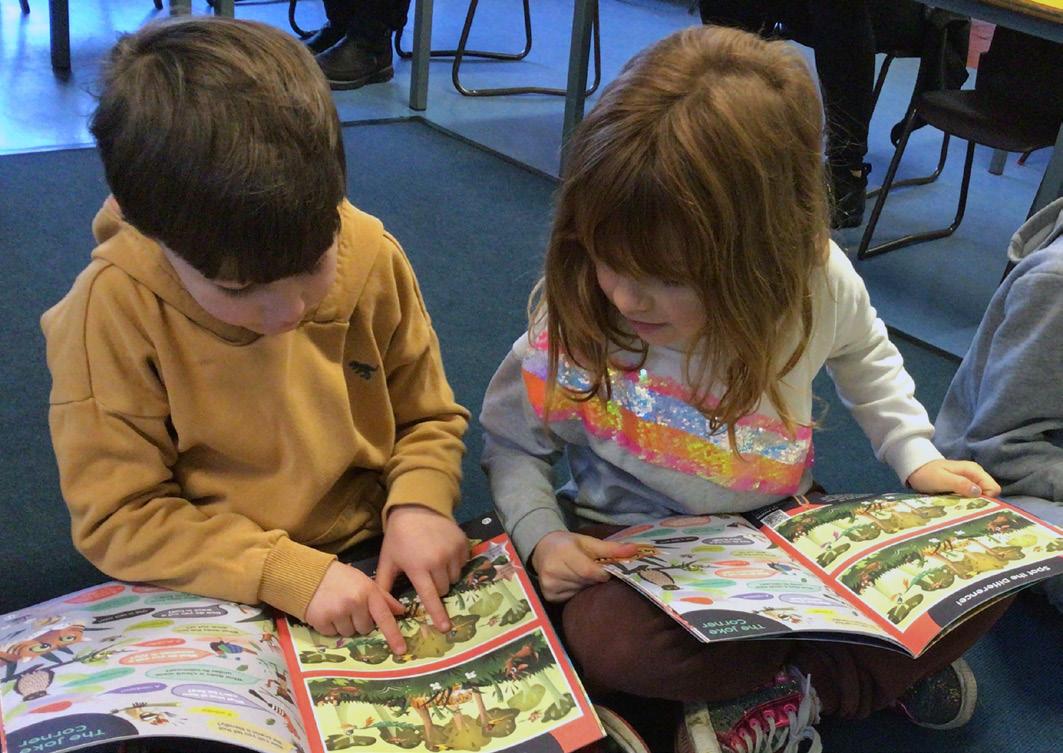
Bookmark’s total income increased to £7.1m from £4.2m, an increase of 70%. During the year, we accrued a significant philanthropic gift which has been committed over the next five years.
Total expenditure of £4.0m was £0.5m higher than the previous year’s expenditure of £3.5m.
The increase in expenditure is attributed to the expansion of our literacy programmes during the financial year.
We finished the year with a surplus of £3.1m (2023: £0.7m) and reserves of £5.1m (2023: £2.0m).
A significant portion of those reserves is linked to a singular philanthropic gift, which the Trustees have designated to support the expansion of our literacy programmes under our three-year strategy. The closing balance of the Literacy Partner Programme Fund is £2.5m (2023: £nil). The charity holds £0.4m (2023: £0.1m) as restricted reserves for programmatic activity in the upcoming academic year and a Fixed Asset designated fund of £0.2m (2023: £0.3m). The remainder of our free reserves, £2.0m (2023: £1.6m) is held to underpin our operations for the coming year and represents just over seven months of our operational spend for the budgeted 2024/25 year. This is within our reserves policy of 25% above or below six months forecasted expenditure.


Our trading subsidiary, Bookmark Reading Trading Limited, produced a surplus of £82k (2023: £46k), which was recognised as income within the charity. Further information is included in Note 13.
A strategic priority of the fundraising team is to continue to grow income from sources beyond the Pindar family network, which will help to prevent an overreliance developing on any one set of donors. The generous support from Literacy Capital and the Pindar family represents 21% of our income in the current financial year. We do remain confident that the Pindar family and Literacy Capital plc will remain committed long-term supporters as they care passionately about improving literacy in the UK. Sharon Pindar knows from personal experience, the impact poor literacy can have on a person’s life, and that of their families.
We are hugely thankful for the continued support from all our donors; their financial support provides the income which enables us to continue our work and to future-proof our organisation to support more children on their reading journeys.
Bookmark Reading Charity is both a registered charity and a company limited by guarantee. It was incorporated as a limited company on 8th December 2017 and registered as a charity on 23 March 2018. The Charity changed its name from Bookmark Reading Limited to Bookmark Reading Charity on 28 January 2018. It is governed by its Memorandum of Association.
The Articles of Association require that there are not less than two and not more than eight Trustees and at least one Trustee must be a natural person. A Trustee may hold office for a period of three years and any retiring Trustee who remains qualified may be re-appointed. The Board of Trustees meets quarterly, and ensures the Charity is well managed and operating within agreed policies, the law and its budget.
The Trustees have reviewed the Charity Governance Code and are using the principles and recommended practice for good governance to effectively manage and control the charity.
The Charity is governed by a Board of Trustees, comprising of Sharon Pindar (Chair of Trustees), Paul Fletcher (Treasurer), Phil Neal, Chloe Wright Helen Jones and Mark Byrne. Each new Trustee is given an appropriate induction and training
relevant to their responsibility. At least one Trustee on the Board is a trained reading volunteer.
The Board delegates the day-to-day management of the Charity to the Chief Executive Officer and the Senior Leadership Team.
Bookmark Reading Charity is compliant with the standards set by the Fundraising Regulator in its ‘Code of Fundraising Practice’. We are pleased to make this commitment and feel it gives both our donors and supporters confidence in our fundraising practices. Bookmark’s fundraising team has experience in the Code of Fundraising Practice and associated Rulebooks.
We are mindful during our fundraising activities not to be unreasonably persistent or to apply undue pressure on anyone, or to intrude on anyone’s privacy. The Charity did not undertake any telephone, doorstep or lottery fundraising in the year.
The Charity received no complaints relating to its fundraising activities during the year.
The Trustees consider the Board of Trustees and the Senior Leadership Team to comprise the key management personnel of the Charity, in charge of directing and controlling, running and operating the Charity on a day -to-day basis.
All Trustees give of their time freely and no Trustee received remuneration during the year. The only payments made were for reimbursed expenses.
Details of related party transactions are disclosed in note 22 to the accounts. The pay of the Chief Executive Officer and senior staff is reviewed annually based on performance and normally increases in accordance with average earnings.
The remuneration is set to ensure it is both fair but also will attract and retain staff of the appropriate calibre and experience required by the Charity.
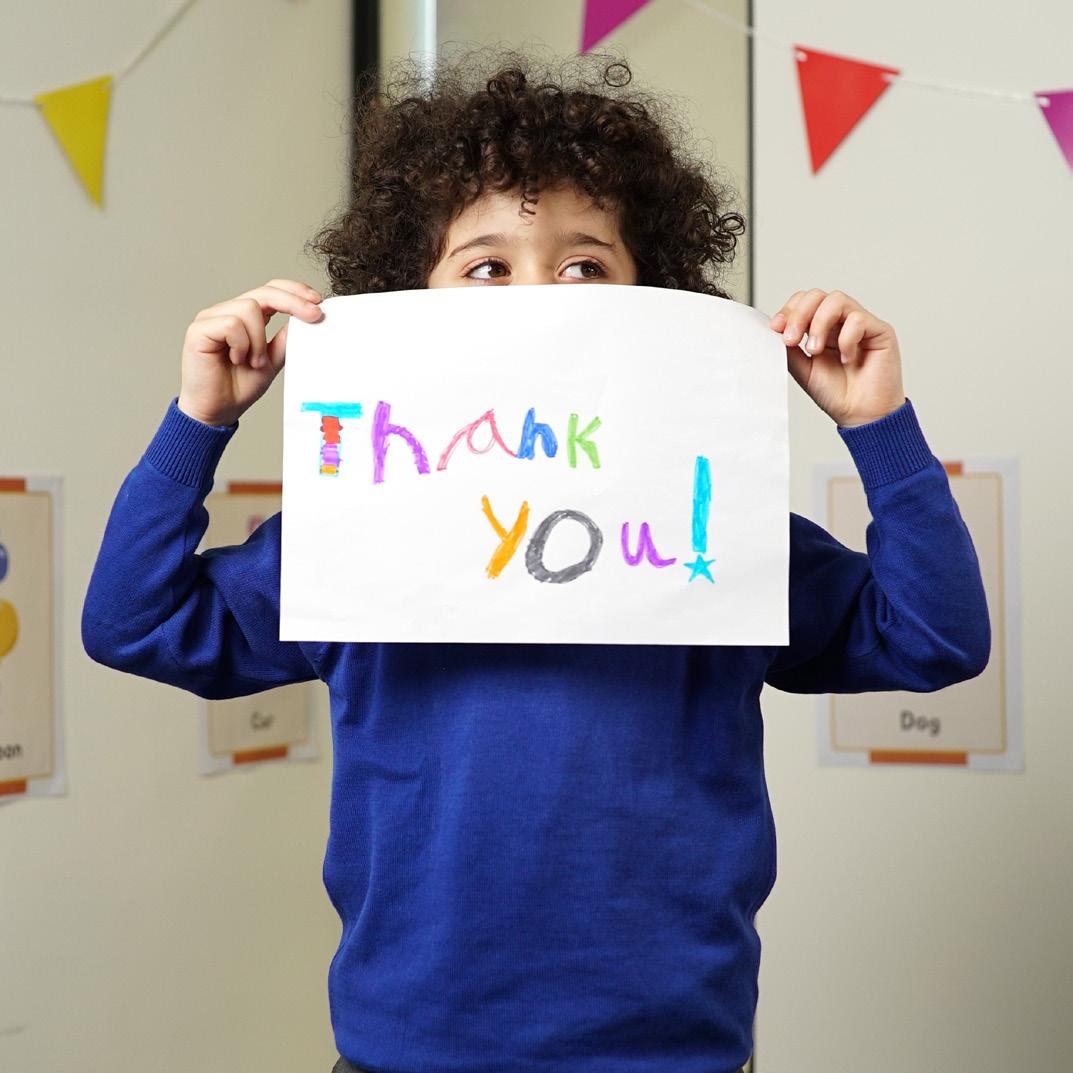
At the 31st August 2024, Bookmark had a team of 42 individuals (41 FTE). The Charity also had 2,937 vetted and trained volunteers.
In addition to the Charity’s Board of Trustees, Bookmark has established the following Boards:
Corporate Partnerships Board
Technology Advisory Group
Volunteer Advisory Board
Marketing Advisory Board
Primary School Advisory Board
Finance and Risk Committee
Operations Board
Investment Committee
Responsible for devising and implementing plans to generate income for the Charity from the corporate sector and identifying sources of corporate volunteers.
The primary purpose of the Technology Advisory Group is to advise on how best to apply industry best practices and provide a comprehensive peer review and oversight of our current and future technology developments. They also ensure the Charity receives input from different technology sectors to support, confirm and challenge our decisionmaking and development.
Responsible for providing feedback, inspiration, challenge, guidance and occasional system testing to ensure Bookmark continues to provide a fulfilling and beneficial volunteer experience.
Responsible for providing strategic input into our marketing and communications strategy, including volunteer and school attraction, digital marketing, brand awareness and PR.
Responsible for providing feedback, inspiration, challenge, and guidance to ensure that Bookmark provides what our customers need, i.e., schools.
Responsible for providing oversight on our financial performance and controls, compliance with standards of business conduct and other legal and regulatory matters, which included the appointment of our external auditors and the integrity of our financial statements. This committee supports our risk management framework and our policy review cycle.
The board supports exploring Bookmark’s ‘problem statements’ to aid solutions by generating innovative ideas by engaging with operational matters at Bookmark.
The board provides insights into new or innovative ways of working, enhancing Bookmark’s offering. This is to ensure Bookmark is a high-impact literacy charity that is data-driven, technology-led and runs efficiently.
The committee comprises our Chair, Treasurer, Chief Executive and Chief Finance and Operations Officer. This group oversees the Charity’s investments on behalf of the Board of Trustees.
These advisory boards have no delegated authorities, cannot pass resolutions on behalf of the Charity, and cannot direct the Senior Leadership Team or other employees of the Charity.
All our staff, volunteers and supporting boards are vital to the work of the Charity, and they have contributed enormously to the success of the organisation and to the services it provides. The Trustees record their sincere appreciation of the contribution from all our staff, volunteers and supporting boards.
We are extremely grateful to the various organisations and individuals who have supported us. We have been provided with management consultancy, legal advice, technology and other incredibly helpful support.
While the Charity has continued to develop a range of income-generating activities to support its charitable activities, Bookmark Reading Charity is heavily reliant on voluntary donations. A significant proportion of this income must be newly generated each year. Bookmark’s donors to date have mainly comprised a small number of significant contributors, including Trusts and Foundations, Major Donors and Corporate Partners. To prevent an overreliance developing on any one set of donors, we plan to continue diversifying our income through engaging new supporters. Our emphasis remains on building long-term sustainable support from corporate donors and major givers.
The Trustees duly consider the uncertainties around funding when setting the Charity’s reserves policy. The Trustees aim to generate reserves that are sufficient to underpin the commitment to the continued growth and development of our services.
During the year, the Trustees have created a designated reserve to underpin our long-term commitment to our Literacy Partner Programme This is shown separately to our free reserves.
The Charity reserves policy states that we aim to have reserves equivalent to ±25% of six month’s forecast expenditure over the coming 12 months. As at 31 August 2024, we have built up unrestricted, free reserves equivalent to 7.3 months and the Trustees are therefore content with this.
The Trustees are pleased to report that the Charity has a robust balance sheet, which will be used to continue to provide services to support its charitable objectives in the UK.
Following NCVO best practice, the risk management process has involved the identification, evaluation, and control of risks. Whilst we are not able to eliminate all risks entirely (this would be impossible and not cost effective), we do aim to reduce the risk to a level that the charity is comfortable with (the risk appetite).
When identifying risks, we assign risk owners and categorise them into the following areas:
• External and Impact
• Regulatory and Compliance
• Financial Sustainability
• Governance
• Operational
• Safeguarding
• Fundraising
We score risks by likelihood (rare, unlikely, possible, probable, certain) and impact (insignificant, minor, moderate, significant, major). We calculate our target risk score to identify our risk appetite. We then analyse the inherent risk using these criteria, and these scores are multiplied to give us our initial risk score.
The Senior Leadership Team record all controls that are in place to mitigate each risk and then calculate the residual risk. If this is higher than the target risk, we identify further initiatives and actions to reduce the risk to an acceptable level.
As well as the work completed by the Senior Leadership Team, risk management and the risk register are discussed at Finance & Risk Committee meetings, where key risks are discussed as well as improvements and suggestions to the processes for risk management are tabled.
The register and a summary of key risks are shared at every Trustee meeting, forming part of a corporate governance and risk standing paper.
The Charity Trustees (who are also Directors for the purposes of company law) are responsible for preparing a Trustees’ Annual Report and financial statements in accordance with applicable law and United Kingdom Accounting Standards (United Kingdom Generally Accepted Accounting Practice).
Company law requires the Charity Trustees to prepare financial statements for each year which give a true and fair view of the state of affairs of the Charitable Company and of the incoming resources and application of resources for that year. In preparing the financial statements, the Trustees are required to:
• Select suitable accounting policies and then apply them consistently;
• Observe the methods and principles in the Charities SORP;
• Make judgements and estimates that are reasonable and prudent;
• State whether applicable UK accounting standards have been followed, subject to any material departures disclosed and explained in the financial statements;
• Prepare the financial statements on the going concern basis unless it is inappropriate to presume that the Charity will continue in business
The Trustees are responsible for keeping proper accounting records that disclose with reasonable accuracy at any time the financial position of the charity and to enable them to ensure that the financial statements comply with the Companies Act 2006. They are also responsible for safeguarding the assets of the Charity and the group and hence taking reasonable steps for the prevention and detection of fraud and other irregularities.
The Trustees are responsible for the maintenance and integrity of the Charity and financial information included on the Charity’s website.
Each trustee has taken steps that they ought to have taken as a trustee in order to make themselves aware of any relevant audit information and to establish that the charity’s auditor is aware of that information. The trustees confirm that there is no relevant information that they know of and of which they know the auditor is unaware.
Hazlewoods have been appointed as Auditors for the year ending 31 August 2024 and they have confirmed their willingness to continue in office.
This report has been prepared in accordance with the special provisions for small companies under Part 15 of the Companies Act 2006.
APPROVAL
This report was approved by the Trustees on XX November 2024 and signed on their behalf.

Sharon Pindar Chair of Trustees
Independent Auditors’ Report to the Trustees and Members of Bookmark Reading Charity for the year ended 31 August 2024
We have audited the financial statements of Bookmark Reading Charity (the ‘charitable company’) for the year ended 31 August 2024 which comprise the statement of financial activities, balance sheet, statement of cash flows and the related notes to the financial statements, including a summary of significant accounting policies. The financial reporting framework that has been applied in their preparation is applicable law and United Kingdom Accounting Standards, including Financial Reporting Standard 102: The Financial Reporting Standard applicable in the UK and Republic of Ireland (United Kingdom Generally Accepted Accounting Practice).
In our opinion, the financial statements:
• give a true and fair view of the state of the charitable company’s affairs as at 31 August 2024 and of its incoming resources and application of resources, including its income and expenditure, for the year then ended;
• have been properly prepared in accordance with United Kingdom Generally Accepted Accounting Practice; and
• have been prepared in accordance with the requirements of the Companies Act 2006.
We conducted our audit in accordance with International Standards on Auditing (UK) (ISAs (UK)) and applicable law. Our responsibilities under those standards are further described in the Auditor’s responsibilities for the audit of the financial statements section of our report. We are independent of the charitable company in accordance with the ethical requirements that are relevant to our audit of the financial statements in the UK, including the FRC’s Ethical Standard, and we have fulfilled our other ethical responsibilities in accordance with these requirements. We believe that the audit evidence we have obtained is sufficient and appropriate to provide a basis for our opinion.
In auditing the financial statements, we have concluded that the trustees’ use of the going concern basis of accounting in the preparation of the financial statements is appropriate.
Based on the work we have performed, we have not identified any material uncertainties relating to events or conditions that, individually or collectively, may cast significant doubt on the charitable company’s ability to continue as a going concern for a period of at least twelve
months from when the original financial statements were authorised for issue.
Our responsibilities and the responsibilities of the Trustees with respect to going concern are described in the relevant sections of this report.
The trustees are responsible for the other information. The other information comprises the information included in the annual report other than the financial statements and our auditor’s report thereon. Our opinion on the financial statements does not cover the other information and, except to the extent otherwise explicitly stated in our report, we do not express any form of assurance conclusion thereon.
In connection with our audit of the financial statements, our responsibility is to read the other information and, in doing so, consider whether the other information is materially inconsistent with the financial statements or our knowledge obtained in the audit or otherwise appears to be materially misstated. If we identify such material inconsistencies or apparent material misstatements, we are required to determine whether there is a material misstatement in the financial statements or a material misstatement
of the other information. If, based on the work we have performed, we conclude that there is a material misstatement of this other information, we are required to report that fact.
We have nothing to report in this regard.
In our opinion, based on the work undertaken in the course of the audit:
• the information given in the Trustees’ Report, which includes the Directors’ Report prepared for the purposes of company law for the financial year for which the financial statements are prepared is consistent with the financial statements; and
• the Directors’ Report included within the Trustees’ Report has been prepared in accordance with applicable legal requirements.
In the light of the knowledge and understanding of the charitable company and its environment obtained in the course of the audit, we have not identified material misstatements in the Directors Report included in the Trustees’ Report.
We have nothing to report in respect of the following matters in relation to which the
Companies Act 2006 requires us to report to you if, in our opinion:
• adequate accounting records have not been kept or returns adequate for our audit have not been received from branches not visited by us;
• the financial statements are not in agreement with the accounting records and returns;
• certain disclosures of trustees’ remuneration specified by law are not made; or
• we have not received all the information and explanations necessary for the purposes of our audit.
As explained more fully in the Trustees’ Responsibilities Statement set out in the Trustees’ Report, the trustees (who are also the directors of the charitable company for the purpose of company law) are responsible for the preparation of the financial statements and for being satisfied that they give a true and fair view, and for such internal control as they trustees determine is necessary to enable the preparation of financial statements that are free from material misstatement, whether due to fraud or error.
In preparing the financial statements, the trustees are responsible for assessing the charitable company’s ability to continue as a going concern, disclosing, as applicable, matters related to going concern and using the going
concern basis of accounting unless the trustees either intend to liquidate the charity or to cease operations, or have no realistic alternative but to do so.
Our objectives are to obtain reasonable assurance about whether the financial statements as a whole are free from material misstatement, whether due to fraud or error, and to issue an auditor’s report that includes our opinion. Reasonable assurance is a high level of assurance, but is not a guarantee that an audit conducted in accordance with ISAs (UK) will always detect a material misstatement when it exists. Misstatements can arise from fraud or error and are considered material if, individually or in the aggregate, they could reasonably be expected to influence the economic decisions of users taken on the basis of these financial statements.
The extent to which our procedures are capable of detecting irregularities, including fraud is detailed below:
Extent to which the audit was capable of detecting irregularities, including fraud
Irregularities, including fraud, are instances of non-compliance with laws and regulations. We design procedures in line with our
responsibilities, outlined above, to detect material misstatements in respect of irregularities, including fraud. The extent to which our procedures are capable of detecting irregularities, including fraud is detailed below:
We considered the nature of the charitable company’s industry and its control environment and reviewed the charitable company’s documentation of their policies and procedures relating to fraud and compliance with laws and regulations. We also enquired of management about their own identification and assessment of the risks of irregularities.
We obtained an understanding of the legal and regulatory framework that the charitable company operates in and identified the key laws and regulations that had a direct effect on the determination of material amounts and disclosures in the financial statements, including the UK Companies Act and tax legislation, and, those that do not have a direct effect on the financial statements but compliance with which may be fundamental to the charitable company’s ability to operate or to avoid a material penalty.
We discussed among the audit engagement team regarding the opportunities and incentives that may exist within the organisation for fraud and how and where fraud might occur in the financial statements.
In common with all audits under ISAs (UK), we are also required to perform specific procedures to respond to the risk of management override. In addressing the risk of fraud through management override of controls, we tested the appropriateness of journal entries and other adjustments; assessed whether the judgments made in accounting estimates are indicative of a potential bias; and evaluated the business rationale of any significant transactions that are unusual or outside the normal course of business
In addition to the above, our procedures to respond to the risks identified included the following:
• reviewing financial statement disclosures by testing to supporting documentation to assess compliance with provisions of relevant laws and regulations described as having a direct effect on the financial statements;
• performing analytical procedures to identify any unusual or unexpected relationships that may indicate risks of material misstatements due to fraud;
• enquiring of management concerning actual and potential litigation and claims and instances of non-compliance with laws and regulations; and
• reading minutes of meetings of those charged with governance.
Our audit procedures were designed to respond to risks of material misstatement in the financial
statements, recognising that the risk of not detecting a material misstatement due to fraud is higher than the risk of not detecting one resulting from error, as fraud may involve deliberate concealment by, for example, forgery, misrepresentation s or through collusion. There are inherent limitations in the audit procedures performed and the further removed noncompliance with laws and regulations is from the events and transactions reflected in the financial statements, the less likely we are to become aware of it.
A further description of our responsibilities is available on the Financial Reporting Council’s website at: www.frc.org.uk/ auditorsresponsibilities. This description forms part of our auditor’s report.
This report is made solely to the charityʼs members, as a body, in accordance with Chapter 3 of Part 16 of the Companies Act 2006. Our audit work has been undertaken so that we might state to the charityʼs members those matters we are required to state to them in an auditorʼs report and for no other purpose. To the fullest extent permitted by law, we do not accept or assume responsibility to anyone other than the charityʼs members as a body, for our audit work, for this report, or for the opinions we have formed.
Independent Auditors’ Report to the Trustees and Members of Bookmark Reading Charity for the year ended 31 August 2024 (continued)

Scott Lawrence FCA (Senior Statutory Auditor)
For and on behalf of: Hazlewoods LLP
Chartered Accountants and Statutory Auditors
Staverton Court, Staverton Cheltenham, GL51 0UX
Date: 15 November 2024
(Incorporating an income & expenditure account)
All gains and losses recognised in the year are included above.
The notes on pages 32-47 form part of these financial statements.
In approving these financial statements as Trustees of the company, the Trustees acknowledge their responsibility for complying with the requirements of the Act with respect to accounting records and for the preparation of accounts.
These financial statements have been prepared in accordance with the provisions applicable to companies subject to the small companies’ regime.
Approved by the Trustees on 11 November 2024

Sharon Pindar Chair of Trustees
Company Number: 11104438
A. Reconciliation of net income/(expenditure) to net cash inflow from operating activities
B. Analysis of the cash and cash equivalents
The financial statements have been prepared in accordance with Accounting and Reporting by Charities: Statement of Recommended Practice applicable to charities preparing their financial statements in accordance with the Financial Reporting Standard applicable in the UK and Republic of Ireland (FRS 102) (effective 1 January 2019) - Charities SORP (FRS 102), the Financial Reporting Standard applicable in the UK and Republic of Ireland (FRS 102) and the Companies Act 2006.
Bookmark Reading Charity meets the definition of a public benefit entity under FRS 102. Assets and liabilities are initially recognised at historical cost or transaction value unless otherwise stated in the relevant accounting policy note(s).
Preparation of the financial statements requires management to make judgements and estimates. The Trustees consider that the only significant area of judgement involved in preparing the financial statements is in relation to the allocation of shared costs between raising funds and charitable activities. The allocation of these costs has been determined by the amount of staff time spent.
The Trustees assess whether the use of going concern is appropriate, i.e. whether there are any material uncertainties related to events or conditions that may cast a significant doubt on the ability of the Charity to continue as a going concern. The Charity has robust controls and measures in place to ensure it closely manages all spend, receives value for money, and has adequate funding in place before entering into future commitments. The Charity uses its CRM system to track all funding opportunities, taking into account stage, probability of success and prudent close dates to calculate its probability weighted income forecast. This information is reflected in a monthly cash forecast to ensure the Trustees and Senior Leadership Team have adequate oversight of the Charity’s projected cash position.
The Trustees make this assessment in respect of one year from the date of approval of the financial statements. On review, the Trustees have concluded that they are to adopt the going concern basis in preparing the annual financial statements.
Donations and legacies represent amounts received during the year. Gifts in kind for use by the Charity are recognised as incoming resources when receivable at a reasonable estimate of their value.
Donations and grants receivable for specific purposes are credited to the statement of financial activities in the year to which they relate as soon as conditions for receipt have been met.
General funds are unrestricted funds which are available for use at the discretion of the Trustees in furtherance of the general objectives of the Charity and which have not been designated for other purposes.
Designated funds are related to:
• Tangible and intangible fixed asset funds. This represents resources that have been used to acquire tangible and intangible fixed assets. The value of this fund at the end of the year, represents the net book value of those tangible and intangible fixed assets.
• Literacy Partner Programme Fund. This is income which the Trustees have designated to support the expansion of our Literacy Partner Programme.
Restricted funds are funds which are to be used in accordance with specific restrictions imposed by Donors or which have been raised by the Charity for particular purposes. The cost of raising and administering such funds are charged against the specific fund. The aim and use of each restricted fund is set out in the notes to the financial statements.
All expenditure is accounted for under the accruals basis. Costs are allocated between charitable costs, cost of raising funds and governance costs. Shared costs have been apportioned across these three headings and where appropriate into restricted expenditure, according to best estimate of usage. The irrecoverable element of Value Added Tax is included with the item of expense to which it relates. Depreciation is allocated to expenditure headings on the basis of the use of the assets concerned.
Contributions payable on behalf of employees to the defined contribution pension scheme are charged to the statement of financial activities as they become payable in accordance with the rules of the scheme.
All expenditure on acquisition, enhancement, production and installation and all intangible fixed assets received by way of donation are capitalised as intangible fixed assets. Intangible fixed assets are stated in the balance sheet at cost less depreciation, or in respect of donated assets, at estimated value at the date of donation less depreciation.
Amortisation is calculated to write off the cost or valuation of intangible assets over their estimated useful lives at the following rates:
Software assets: 3 years straight line Assets under construction: Nil
All expenditure on acquisition, enhancement, production and installation and all fixed assets received by way of donation are capitalised as fixed assets. Fixed assets are stated in the balance sheet at cost less depreciation, or in respect of donated assets, at estimated value at the date of donation less depreciation. Portable computers are not capitalised. Depreciation is calculated to write off the cost or valuation of tangible assets over their estimated useful lives.
Trade and other debtors are recognised at the settlement amount due after any trade discount offered. Prepayments are valued at the amount prepaid net of any trade discounts due.
Stock are stated at the lower of direct cost and net realisable value.
Cash at bank and cash in hand includes cash and short term highly liquid investments with a short maturity of three months or less from the date of acquisition or opening of the deposit or similar account.
Creditors and provisions are recognised where the Charity has a present obligation resulting from a past event that will probably result in the transfer of funds to a third party and the amount due to settle the obligation can be measured or estimated reliably. Creditors and provisions are normally recognised at their settlement amount after allowing for any trade discounts due.
The Charity only has financial assets and financial liabilities of a kind that qualify as basic financial instruments. Basic financial instruments are initially recognised at transaction value and subsequently measured at their settlement value with the exception of bank loans which are subsequently measured at amortised cost using the effective interest method.
The cost of and income from operating leases is charged and credited to the profit and loss account on a straight -line basis over the lease term.
All resources expended are classified under activity headings that aggregate all costs related to the category. Irrecoverable VAT is charged against the category of resources expended for which it was incurred.
Donated services or facilities are recognised as income when the Charity has control over the item, any conditions associated with the donated item and have been met, the receipt of the economic benefit from the use by the Charity of the item is probable and the economic benefit can be measured reliably. In accordance with the Charities SORP (FRS102), general volunteer time is not recognised. On receipt, donated services and facilities are recognised on the basis of the value of the gift to the Charity which is the amount the Charity would have been willing to pay to obtain services or facilities of equivalent economic benefit on the open market; a corresponding amount is then recognised in expenditure in the period of receipt.
Investments are held in the trading subsidiary, Bookmark Reading Trading Limited. Any other investments are managed by the Investment Committee, which has delegated authority from the Board of Trustees. Investments are held to further the charitable objectives of the organisation.
During the year, we accrued a significant philanthropic gift which has been committed over the next five years.
The nature of donated services received during the year were:
Within Donated services, £15,944 was recognised as assets in the form of technical support provided which has been capitalised or as stock which is yet to be distributed.
Included in Restricted Income are funds received in the year ending 31 August 2024 of £ 354,877 relating to activities and expenditure due to be delivered in the year ending 31 August 2025.
The retained profits of Bookmark Reading Trading Limited for the year ending 31 August 2024 of £82,164 (2023: £46,174) were donated to Bookmark Reading Charity in the form of a Gift Aid donation.
Fundraising costs have increased in the current financial year in relation to a one-off fundraising event in 2024.
One-to-one Reading Programme (1)
Our reading programmes involve 30-minute sessions each week with a child who needs extra support with their reading. This can be either face-to-face in a local primary school or virtually through our secure online platform.
Literacy Programmes (2)
During the year we delivered our established literacy programmes, including The Story Corner Magazine, Your Story Corner, the Literacy Partner Programme, as well as our School Packages. This includes our impact and evaluation work which underpins our programmes.
(3)
During the year we launched new literacy programmes including our Story Starter Programme and our School Network Programme. Under our new three -year strategy, we will deliver 10 Literacy Programmes.
Reading Program (1)
Bookmark Reading Charity’s six-week reading programme. Each programme involves two 30-minute, one-to-one sessions each week. Each session is clearly structured and comprises a combination of reading books, playing games and using their imagination for storytelling
4)
There were 4 key projects/pilots undertaken during the prior year:
Digital Transformation Project – this project was launched in June 2023 and transitioned our stakeholders to a new user experience, taking into consideration internal and external feedback on our school hub.
Bookmark Book Booster – this pack includes: a specially curated book pack worth £150 each for three terms; story corner magazines and support for ‘book chat’ to create a Whole School Reading Culture.
Comic Book Club – we launched our Comic Book Club (pilot) with the aims of engaging reluctant readers, helping to develop a whole school reading culture and exploring how we can further support schools.
OC&C Strategic support – during the year we were supported by OC&C Strategy Consultants in a strategic review of our operations, with a particular focus on our volunteering operations. This work has formed the basis of our upcoming strategy development.
The Story Corner magazine, Bookmark’s free, highquality magazine for children to enjoy at home
Your Story Corner focuses on improving school reading resources by delivering a free box of 200 books to a school. Rocket packs are book bundles sent to qualifying partner schools, on a termly basis, and are curated to ensure that every pack is providing new resources to our partner schools. In the prior year this activity only included Your Story Corner.
As part of our work to help develop whole school reading cultures, Bookmark is offering a limited number of grants to primary schools to help them address their specific literacy needs. We have two types of grants available:
• Whole School Reading Culture project grant (up to £5,000)
• Whole School Reading Culture teacher CPD grant (up to £500)
Governance costs include internal and external audit, legal advice for trustees and are associated with constitutional and statutory requirements, including the cost of preparing for and holding trustee meetings.
Charitable Activities
The average number of full-time equivalent employees (excluding Trustees) was:
The number of employees whose emoluments (salaries, wages and benefits in kind but excluding compensation for loss of office) for the year to 31 August 2024 fell within the following bands was as follows:
The current key management personnel of the Charity comprise the Chief Executive Officer, the Chief Finance and Operations Officer, the Head of Marketing and Communications, the Head of Fundraising, the Head of Technology, the Head of Volunteering and the Head of Schools. During the year, the following roles were present as members of the key management personnel: the Head of Communications and Ambassador Relations.
Further details of changes in these individuals can be found on page 3. The total employee benefits of the key management personnel of the Charity for the year to 31 August 2024 were £566,674 (2023: £582,478) and represents the total cost for the individuals outlined on page 3 during their times of service.
The Charity is supported by volunteers who receive £nil remuneration. At 31 August 2024 we had 2,937 trained and vetted volunteers. These volunteers are available to read with children on the Charity’s One-to-one Reading Programme. In addition, during the financial year volunteers also supported the Charity as Interview Note Takers (supporting the onboarding of other volunteers), Library Builders (collating the resource packs for Your Story Corner), running Bookmark Brunches, packing Story Starter Programme bags and session co-ordinators (attending schools and supporting the on-line reading sessions at schools).
The Charity is exempt from tax on income and gains falling within section 505 of the Taxes Act 1988 or section 252 of the taxation of Chargeable Gains Act 1992 to the extent that these are applied to its charitable objects.
Assets under construction related to a digital dashboard project which was being implemented over the end of the financial year.
The wholly owned subsidiary, Bookmark Reading Trading Limited, is a company registered in England and Wales. It is used to operate the non-charitable activities of Bookmark Reading Charity.
Bookmark Reading Trading Limited has only one share of £1 in issue, which is held by Bookmark Reading Charity.
The activities and results of Bookmark Reading Trading Limited were:
At 31 August 2024, Bookmark Reading Trading Limited had the following assets and liabilities:
Consolidated accounts for Bookmark Reading Charity have not been prepared as the investment is not deemed to be material.
During the year Bookmark received a donation in the form of shares. These shares were held at market value, as at 31 August 2024 as these had not been sold by the year end. Unreaslised gains of £17,646 (2023/24: £nil) are shown on the Statement of Financial Activities.
The shares were subsequently sold for cash on 5th September 2024, to support Bookmarks programmatic plans for the upcoming academic year.
The increase in accrued income relates to a donation from a philanthropic donor. This multi -year gift has been recognised, in-line with the Charities SORP. It will be reduced over the next five years on an annual basis starting from 2025. No cash or assets have been received, in relation to this gift as at 31 August 2024.
Stock relates to reading resources held at the Charity’s headquarters as at the end of the financial year.
The increase in accrued expenditure relates to programmatic expenditure which has been committed to by Bookmark, with respect to Literacy Programmes, before the end of the financial year. This activity will take place in subsequent academic years.
Designated funds are related to:
• Tangible and intangible fixed asset funds. This represents resources that have been used to acquire tangible and intangible fixed assets. The value of this fund at the end of the year, represents the net book value of those tangible and intangible fixed assets.
• Literacy Partner Programme Fund. This is income which the Trustees have designated to support the expansion of our Literacy Partner Programme.
During the year we received restricted funding to support our Your Story Programme across three new geographic areas. Funding received from a range of donors during the year supports a range of our 10 Literacy Programmes. Transfers between funds consist of £nil (2023: £206,163) transferred from restricted, £89,654 (2023: £4,392) to the Charity’s Tangible and Intangible designated fixed asset fund and £11,948 (2023: £nil) to the Literacy Partner Programme Fund. The transfer relates to assets capitalised during the year, net of any amortisation or disposals recognised.
Prior year analysis
Programme funding (f)
Your Story Corner (a)
Your Story Corner focuses on improving school reading resources by delivering a free box of 200 books to a school.
Digital Transformation (b)
Project to identify and improve the functionality, supportability, agility and costeffectiveness of our technology and its support.
Grants (c)
As part of our work to help develop whole school reading cultures, Bookmark offered a limited number of grants to primary schools to help them address their specific literacy needs. Two types of grants were available:
• Whole School Reading Culture project grant (up to £5,000)
• Whole School Reading Culture teacher CPD grant (up to £500)
Reading Programme (d)
Bookmark Reading Charity’s six-week reading programme. Each programme involves two 30-minute, one-to-one sessions each week. Each session is clearly structured and comprises a combination of reading books, playing games and using their imagination for storytelling
The Company does not have a share capital as it is limited by guarantee. Each of the Members is a guarantor to the extent of £1 in the event of the Company being wound up whilst they are Members, in respect of debts and liabilities contracted before they ceased to be a Member. There were 3 Members at 31 August 2024 (3 Members at 31 August 2023).
At 31 August 2024 the Charity had total capital commitments of £nil (2023: £9,435 ) relating to the intangible software development costs either contracted or authorised by the Trustees.
At 31 August 2024 the Charity had total operating lease commitments of £33,216 (2023: £34,068 ) relating to the lease of the Charity’s office building and a photocopier.
The amount of non-cancellable operating lease payments recognised as an expense during the year was £130,922 (2023: £139,728)
During the year, the charity received payments of £1,500,114 (2023: £1,505,551) from Literacy Capital plc in the form of corporate donations, grants and sponsorship for charity events. Literacy Capital plc is a company in which Paul Pindar, spouse of Trustee Sharon Pindar, is a director. Of this amount, a total of £303,896 (2023: £507,316) was restricted income and £1,196,218 (2023: £998,236) was unrestricted income.
During the year, the charity paid £129,600 (2023: £129,600) to Literacy Capital plc in relation to rent for the Charity’s office building. At the year end, there was a balance of £10,800 (2023: £10,800) included in debtors in relation to prepaid rent.
During the year, the charity received £nil (2023: £173) from S Pindar in the form of Gift Aid donations. Of this amount, a total of £nil (2023: £73) was restricted income and £nil (2023: £100) was unrestricted income.
During the year, the charity received £100 (2023: £210) from P Fletcher in the form of Gift Aid donations. Of this amount, a total of £nil (2023: £nil) was restricted income and £100 (2023: £210) was unrestricted income.
During the year, the charity received £10,000 (2023: £15,000) from P Pindar in the form of Gift Aid donations. Of this amount, a total of £nil (2023: £5,000) was restricted income and £10,000 (2023: £10,000) was unrestricted income. Paul Pindar is the spouse of Trustee, Sharon Pindar.
Expenses, relating to travel, reimbursed to Trustees during the year amounted to £73 (2023: £nil).
During the year, the charity recognised £82,164 (2023: £46,174) from its subsidiary, Bookmark Reading Trading Limited, in the form of a Gift Aid donation. The subsidiary is wholly owned. At the year end, the amount owed by Bookmark Reading Trading Limited to the charity was £82,164 (2023: £46,174). In the current year, this amount represents the profits owed by Bookmark Reading Trading Limited.